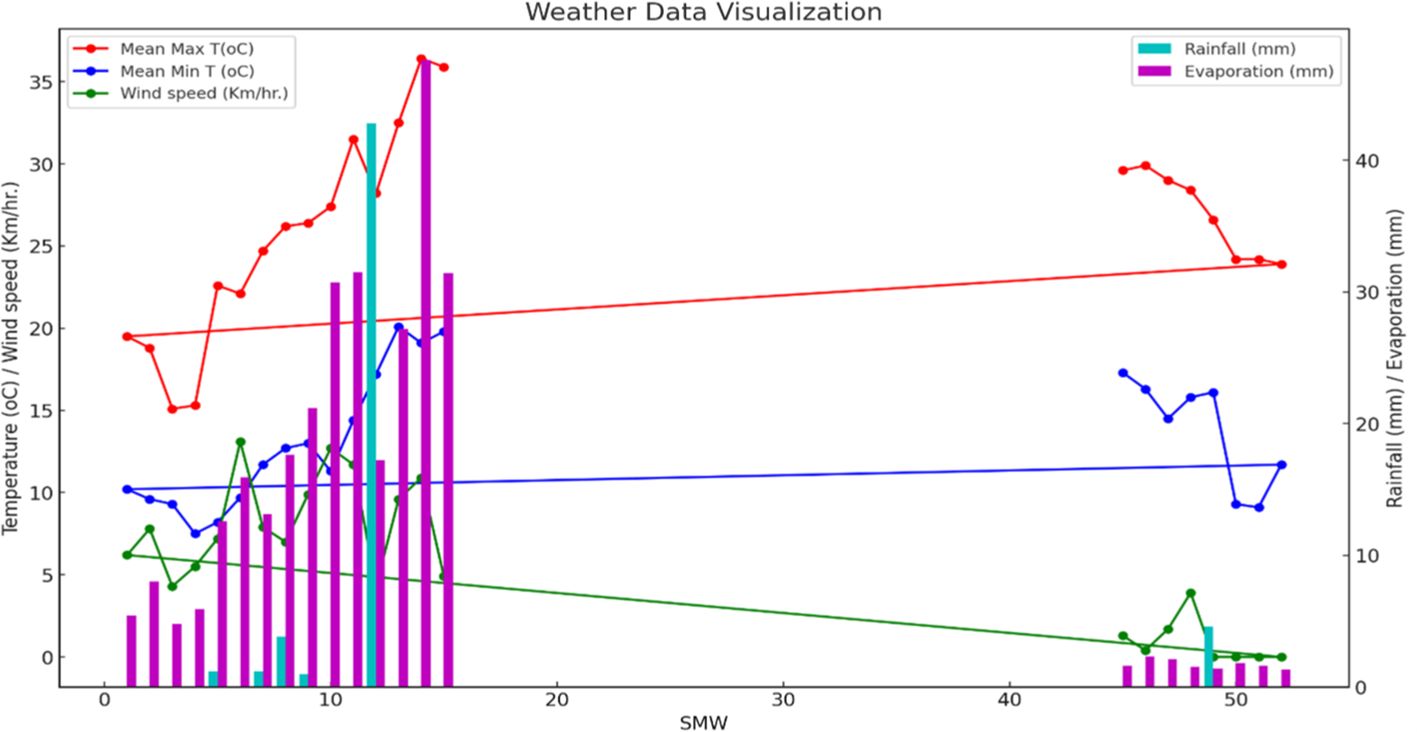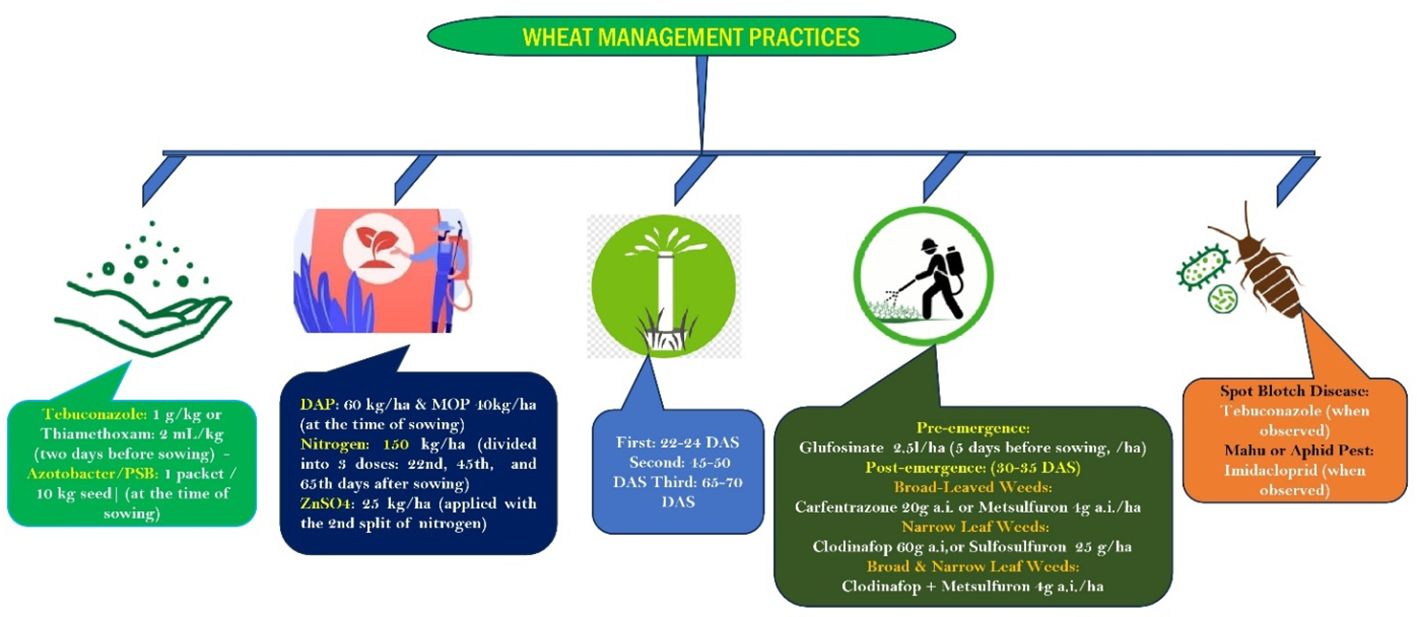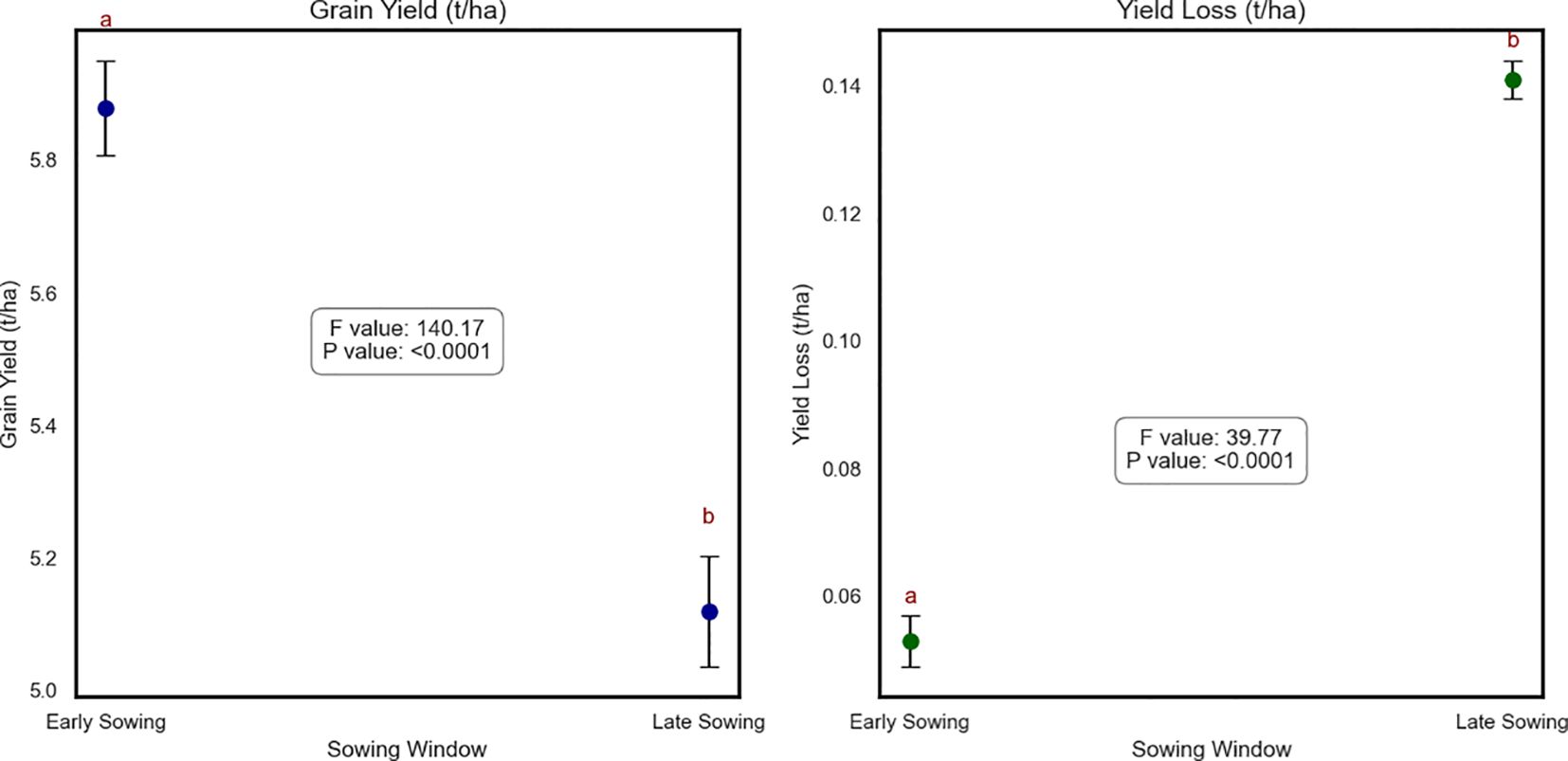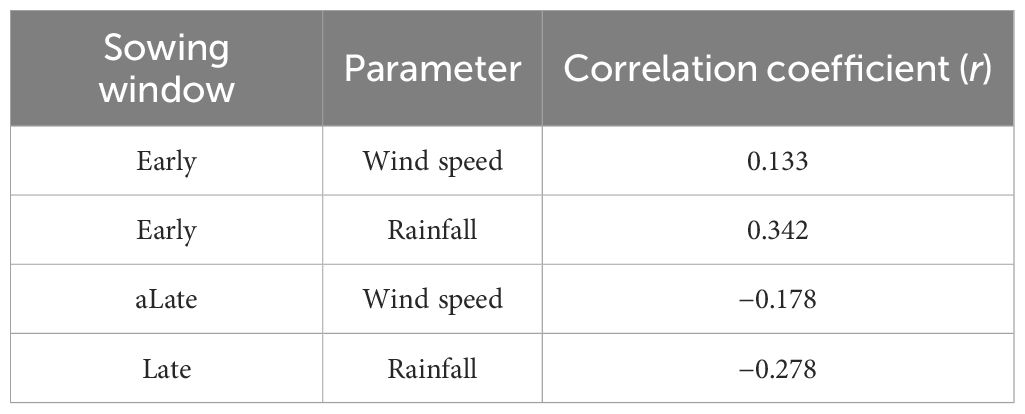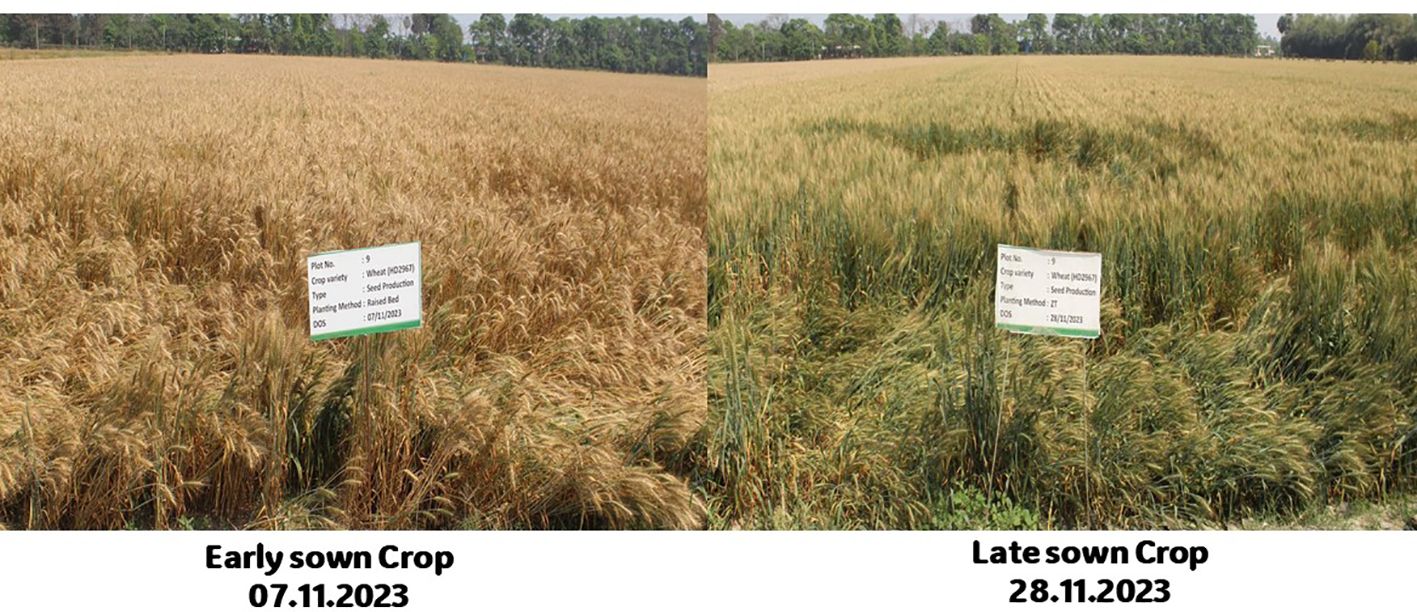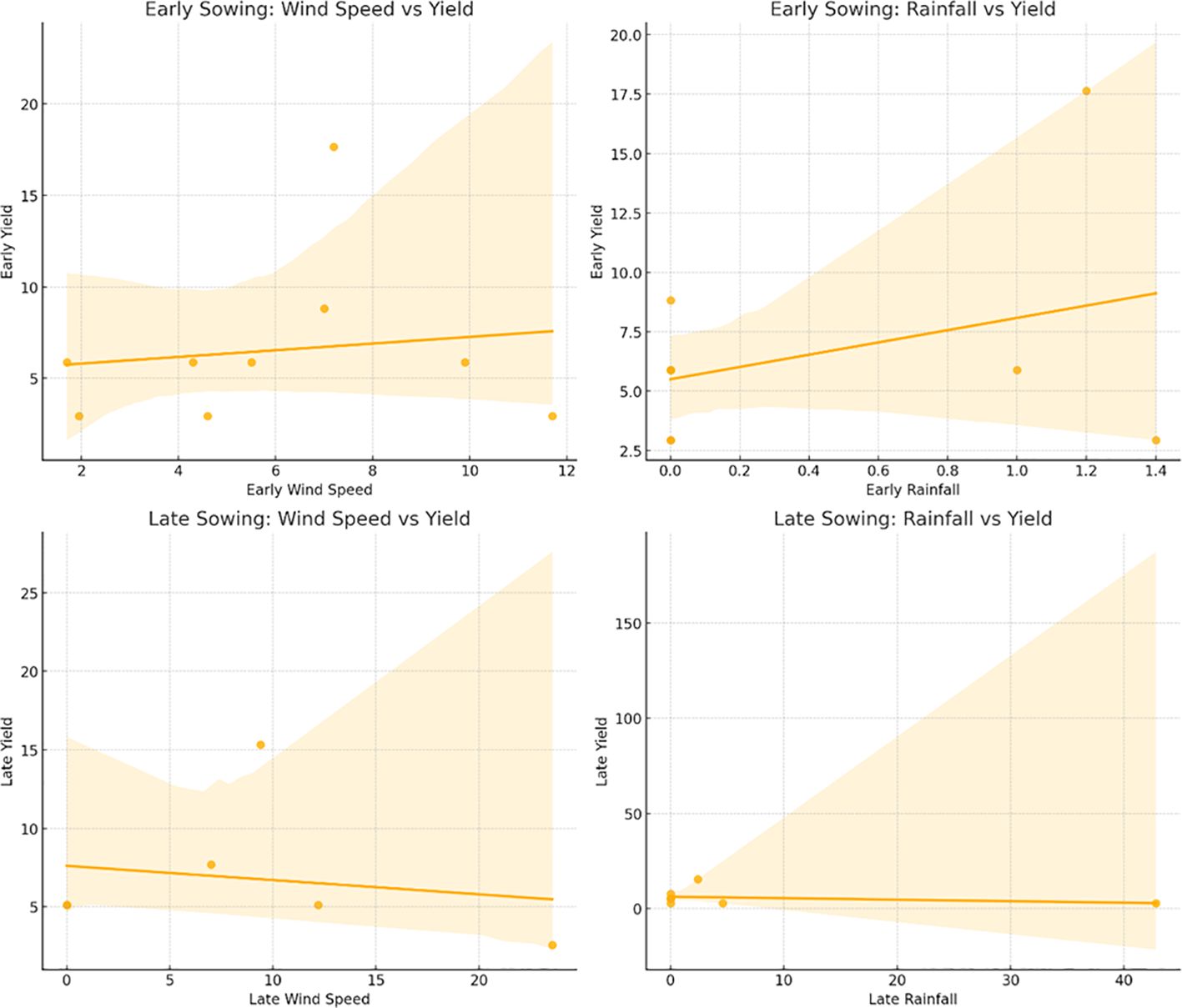- 1Borlaug Institute for South Asia (BISA), Samastipur, Bihar, India
- 2ICAR-Indian Agricultural Research Institute, Regional Station, Samastipur, Bihar, India
- 3Bihar Agricultural University, Bhagalpur, Bihar, India
- 4Dr. Rajendra Prasad Central Agricultural University, Samastipur, Bihar, India
- 5Krishi Vigyan Kendra, Nalanda, Bihar, India
- 6Krishi Vigyan Kendra, Banka, Bihar, India
- 7Krishi Vigyan Kendra, Nawada, Bihar, India
- 8ICAR-National Research Centre on Pomegranate, Solapur, Maharashtra, India
- 9Krishi Vigyan Kendra, Munger, Bihar, India
- 10Krishi Vigyan Kendra, Katihar, Bihar, India
- 11Krishi Vigyan Kendra, Rohtas, Bihar, India
- 12Krishi Vigyan Kendra, Purnea, Bihar, India
- 13Krishi Vigyan Kendra, Samastipur, Bihar, India
- 14Krishi Vigyan Kendra, Vaishali,Bihar, India
- 15ICAR-Central Research Institute of Dryland Agriculture Santoshnagar, Hyderabad, India
- 16ICAR-Research Complex for Eastern Region, Patna, Bihar, India
Wheat production in subtropical agroecosystems is increasingly challenged by climate-induced stresses such as lodging, terminal heat, and erratic rainfall patterns. This study was conducted during the 2023–2024 rabi season across eight locations, namely, the Borlaug Institute for South Asia (BISA) Research Station at Pusa and seven project hubs located in the districts of Munger, Nawada, Nalanda, Katihar, Purnea, Samastipur, and Vaishali in Bihar, India, and evaluated climate-resilient agronomic strategies to enhance wheat resilience and productivity. A randomized block design with 20 replications was used to assess the interactive effects of tillage practices [conventional tillage (CT), zero tillage (ZT), and permanent raised bed (PRB)], sowing times (early vs. timely), and wheat varieties (HD2967, DBW187, and DBW316) on crop performance. Results indicated that PRB and ZT strategies significantly (p < 0.05) reduced (80%–90%) risk of lodging and increased (15%–25%) wheat grain yield compared to CT. Furthermore, early sowing (first fortnight of November) and the use of lodging-resilient varieties of HD2967 and DBW187 reduced crop lodging, improved crop performance, and increased wheat grain yield compared to late sowing (second fortnight of November) and the DBW316 variety, respectively. Correlation and regression analysis studies exposed a weak positive correlation between yield and wind speed (r = 0.133) and a stronger positive correlation effect with rainfall (r = 0.342) during early-sown crops, with stepwise regression indicating yield gains of 0.32 t/ha and 1.15 t/ha under optimum wind speed and rainfall, respectively (r = 0.68). In contrast, late sowing exhibited negative correlations, with yield declining by 0.39 and 0.12 t/ha under aberrant wind and rainfall conditions, respectively (r = 0.52). The study emphasized the significance of adopting climate-resilient agronomic strategies, such as ZT, appropriate variety selection (HD2967 and DBW187), and early sowing, to enhance the sustainability and resilience of wheat production under adverse climatic conditions.
1 Introduction
Wheat lodging, a major challenge in the agroecological landscape of India, threatens sustainable wheat production by reducing yield (10%–50%) and quality. Climate change intensifies this challenge, underscoring the need for climate-resilient agriculture (CRA) practices to safeguard productivity and sustainability. Optimizing planting methods, selecting suitable varieties, and adjusting planting dates mitigate lodging risks (Khedwal et al., 2023; Sharma et al., 2023). Implementing these CRA strategies in the agricultural landscape can enhance wheat resilience and sustainability in the region of subtropical agroecological landscape, ensuring agri-food security and farmer livelihoods amidst changing climatic conditions (Singh et al., 2023; Lakhani et al., 2024). The Indo-Gangetic Plain (IGP), the largest wheat-growing region in South Asia, allocates approximately 10 Mha in India for wheat cultivation (McDonald et al., 2022). While the Western Indo-Gangetic Plain (WIGP), which achieves higher wheat productivity (Punjab, 4.5 t/ha; Haryana, 4.0 t/ha), outperforms the Eastern Indo-Gangetic Plain (EIGP), encompassing Bihar (2.8 t/ha), Jharkhand (2.6 t/ha), and parts of eastern Uttar Pradesh (3.0 t/ha), the latter faces notable yield gaps due to several factors, including climatic late planting, low-yielding varieties, water and nutrient limitations, and weed infestations (Meena et al., 2024). These factors contribute to a yield gap of approximately 73% in wheat production (Pathak et al., 2003; Jain et al., 2016), which are influenced by climate change impacts, management practices, and resource challenges (Ladha et al., 2003; Meena et al., 2022a). Despite these challenges, lodging remains one of the most critical and unavoidable consequences of environmental stress, leading to a yield reduction of 20%–50% (Rehman et al., 2024; Rempelos et al., 2020; Hasanain et al., 2024). Wheat lodging, caused by stem bending or breaking under grain weight, is influenced by factors like rain, wind, weak stems, and poor root growth (Jinger et al., 2023; Zhang et al., 2017). Varietal traits, sowing timing, and crop establishment methods are crucial, requiring effective management for sustained productivity (Shah et al., 2019; Meena et al., 2022b). This not only makes the work of harvesting difficult but also results in yield loss of up to 80% (Niu et al., 2016a), reducing the quality of grains (15%) and increasing vulnerability to diseases (Martínez, 2021; Shah et al., 2019).
Nowadays, the intensive use of agricultural resources has led to significant degradation of agroecosystems (Choudhary et al., 2022; Hasanain et al., 2025; Meena et al., 2024). Nations worldwide are striving to achieve sustainable agri-food production growth while preserving and enhancing natural resources responsibly (Foley et al., 2011; Jat et al., 2020). Subsequently, it is critical to develop modern solutions that enhance crop yield while avoiding adverse cultivation practices such as intensive tillage, low-yielding varietal selection, delayed sowing windows, and excessive input usage for wheat production (Hasanain et al., 2024; Meena et al., 2024). Failure to consider these factors threatens ecosystem services and develops the risk of lodging, further endangering agricultural sustainability (Foley et al., 2011).
Intensive tillage methods like conventional tillage (CT) are commonly used to enhance soil aeration, control weeds, and promote early crop growth in wheat production (Lal, 2015). However, CT is energy-intensive and time-consuming, as it requires repeated ploughing, which can delay soil preparation and shorten the window for timely wheat sowing (Hasanain et al., 2025). Moreover, under changing climatic conditions, particularly increased and unpredictable precipitation, land preparation using CT becomes more challenging (Koskey et al., 2022). This also shortens crop growth periods, as the soil disturbance and compaction delay root establishment and reduce the soil moisture retention, thus limiting the time available for optimal growth (Meena et al., 2022c; Parewa et al., 2022; Das et al., 2025). Furthermore, it raises the cost of cultivation due to the increased labor, fuel, and equipment required for multiple tillage operations compared to CT methods (Pittelkow et al., 2015; Hasanain et al., 2025). Furthermore, it decreases the stability of the soil structure by breaking the soil aggregates and forming a compact layer beneath the plough layer, which hinders root growth and penetration (Meena et al., 2022b). It leads to deprived root anchorage. Weak root systems make plants more vulnerable to lodging, especially in adverse weather conditions (Gathala et al., 2011; Khan et al., 2019).
Puddled transplanted rice cultivation creates an impermeable hardpan below the ploughing layer (Ladha et al., 2003; Meena et al., 2022a; Das et al., 2025). A combination of puddling and continuous CT for succeeding wheat cultivation results in the formation of a hardpan layer, which negatively affects root growth and enhances the risks of lodging (Sharma et al., 2023; Jat et al., 2021; Ahmad et al., 2021).
Conversely, zero tillage (ZT) and permanent raised bed (PRB) methods are effective solutions for CT. ZT minimizes soil disturbance and retains crop residues on the surface, enhancing soil health, improving water retention, and reducing erosion rates by up to 60% (Pittelkow et al., 2015; Jat et al., 2021; Hobbs et al., 2008). The ZT has expanded widespread support throughout the IGP because of its ability to conserve resources and enhance farm productivity (Jat et al., 2021). By avoiding ploughing, ZT facilitates the earlier sowing of wheat, which can help to better crop establishment and improve yields significantly (10%–80%) compared with the CT method (Gathala et al., 2011; Jat et al., 2020; Koskey et al., 2022). ZT promotes moisture retention (8%–50%) in the soil, decreases weed infestation (10%–30%), and enhances the soil health (Derpsch et al., 2010). Notably, ZT improves root development and growth by evading the formation of hardpans and increasing soil porosity, leading to robust root systems and reducing lodging incidence (Sharma et al., 2019). Research has indicated that ZT wheat in the rice–wheat system leads to higher yields (5%–20%) and profitability (10%–30%) due to early stand and less lodging, and saves fuel (30%–50%), labor costs (20%–30%), and the total cost of cultivation, thus increasing the farmer’s income (Jat et al., 2021; Gathala et al., 2011; Farooq et al., 2011; Alhammad et al., 2023).
The PRB method, which involves planting wheat on beds, enhances input (nutrient and water) use efficiency and reduces weed pressure and crop lodging (Sayre and Hobbs, 2004). RBP also reduces the seed rates and improves nutrient use efficiency (10%–40%) by placing the fertilizers in the root zone, and reduces (10%–30%) the cost of cultivation (Govaerts et al., 2006; Srinivasarao et al., 2023; Fischer et al., 2009; Jat et al., 2020). In addition, the PRB system improves soil aeration and drainage, increasing root strength and reducing the chances of lodging (Kumar et al., 2023).
Choosing strong-stemmed wheat varieties and optimal sowing times prevent lodging, ensuring better crop establishment and increasing yield and resilience to adverse conditions (Rehman et al., 2024; Hossain et al., 2021). However, the benefits are more apparent; implementing ZT faces difficulties such as requiring specialized machinery and high initial costs (Friedrich et al., 2012). However, its long-term advantages, such as improved soil health and reduced rate of soil erosion, justify its merit (Govaerts et al., 2006; Gathala et al., 2011; Jat et al., 2020).
We hypothesized that adopting climate-resilient appropriate planting techniques (PRB, ZT, and CT) will enhance lodging resistance, yield, and resilience in wheat production. Therefore, the objectives of this study were to (i) evaluate how different planting techniques (RBP, CT, and ZT) impact lodging, yield, and resilience in wheat; (ii) assess the influence of planting windows on lodging and productivity in wheat crops; (iii) investigate the effects of wheat variety selection on climate resilience and productivity; and (iv) study root morphology variations under different planting methods to understand their impact on lodging resistance and yield stability.
2 Materials and methods
2.1 Experimental site and design
A large field experiment was conducted at the Borlaug Institute for South Asia (BISA) (25°78’N, 85°67’E, 52.9 aMSL) Pusa, Samastipur, Bihar, India during the rabi season of 2023–2024. The location is situated within the Fourth Agro-Climatic Zone of India and is classified as the “PC2 Middle Gangetic Plain Zone” as per the Fifteen All India Agro-Climatic Zone classifications (Figure 1a). The experiment was designed using a randomized block design (RBD) with 20 replications for each treatment combination to ensure the robustness and reliability of the findings. The objectives were to evaluate the effects of three crop establishment methods of CT, ZT, and PRB. Also, two different sowing windows (07 November 2024 and 28 November 2024) and three wheat varieties (HD2967, DBW 187, and DBW 316) were tested on lodging mitigation and wheat productivity. The experimental plots have been consistently maintained with the same planting techniques since 2014.
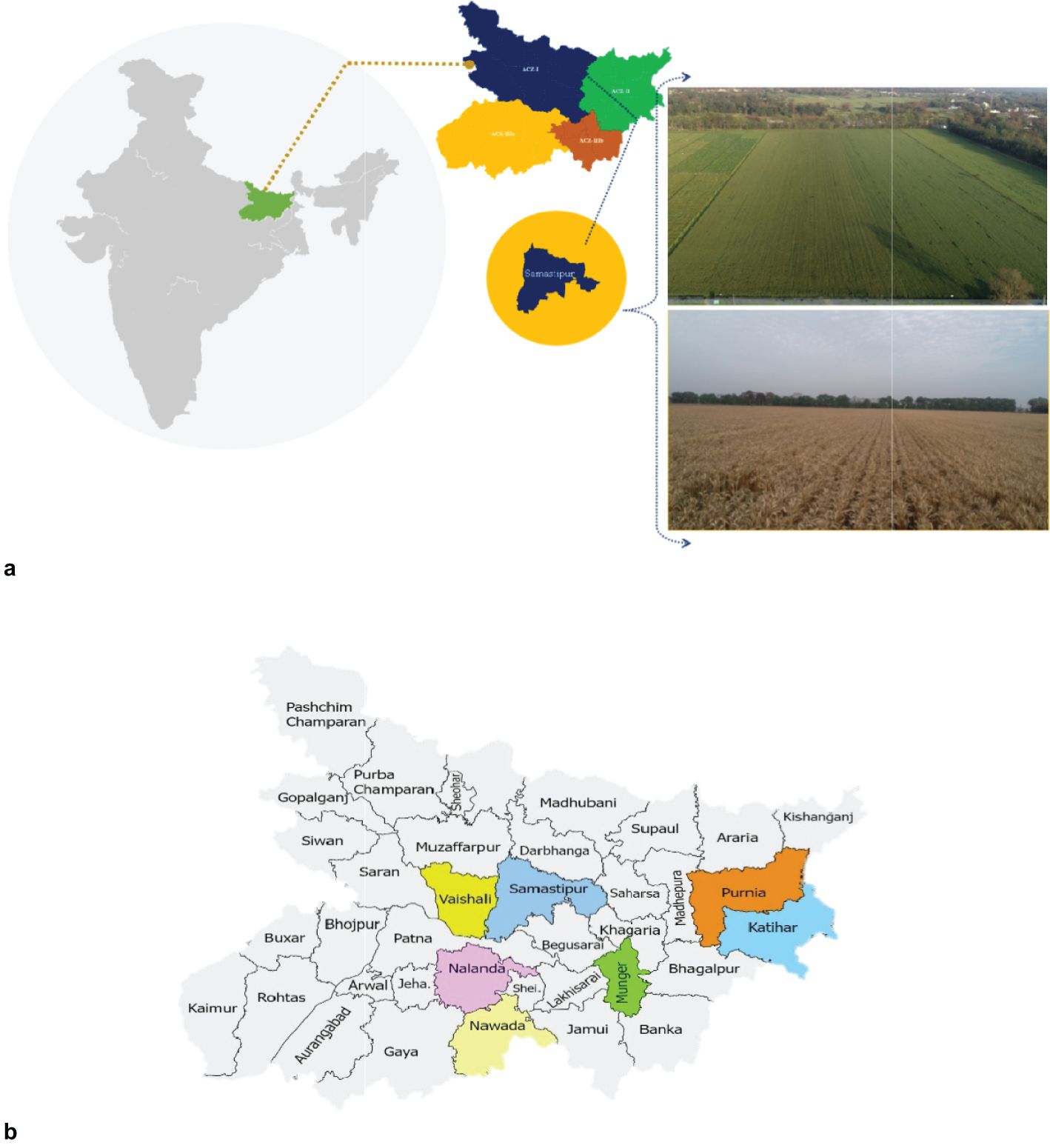
Figure 1. (a) Experimental site at the research station of the Borlaug Institute for South Asia (BISA). (b) Farm-level experiences from seven project sites across different districts and agro-climatic zones.
To validate the findings at the farm level, data were collected from seven project hubs in Munger (25°37’N, 86°47’E), Nawada (24°88’N, 85°54’E), Nalanda (25°26’N, 85°47’E), Katihar (25°55’N, 87°56’E), Purnea (25°77’N, 87°47’E), Samastipur (25°85’N, 85°78’E), and Vaishali (25°68’N, 85°35’E) districts (Figure 1b). A total of 210 demonstrations were surveyed across these locations to capture the diversity of local agro-ecological conditions.
2.2 Climatic conditions
The climate at the experimental location was described as hot–dry in the summer and cold in the winter. The average annual rainfall was approximately 1,309 mm. In the hottest months of May and June, the average maximum temperature was 35.5°C–40.2°C, whereas the average minimum temperature ranged from 21.3°C to 23.9°C. January is the coldest month of the year, with an average maximum temperature of 17.6°C and an average minimum temperature of 8.9°C. The monthly mean morning relative humidity (RH) ranged from 80% to 97%, while the monthly mean evening RH ranged from 46% to 77%. The monthly mean evaporation rates during the monsoon season (kharif) range from 3.0 to 6.9 mm, and during the winter season (rabi), they range from 0.9 to 2.3 mm (Figure 2).
2.3 Long-term data analysis for wheat lodging and yield loss assessment (2014–2023)
Ten years of data (2014–2023) on wheat lodging and associated yield losses were collected from farmers’ fields across three agro-climatic zones of Bihar: (i) North-West Alluvial Plains, (ii) North-East Alluvial Plains, and (iii) South Bihar Alluvial Plains (Figure 3a) under BISA’s Climate-Resilient Agriculture Project. This long-term data collection aimed to identify trends and address the ongoing issue of lodging in the region’s wheat production.
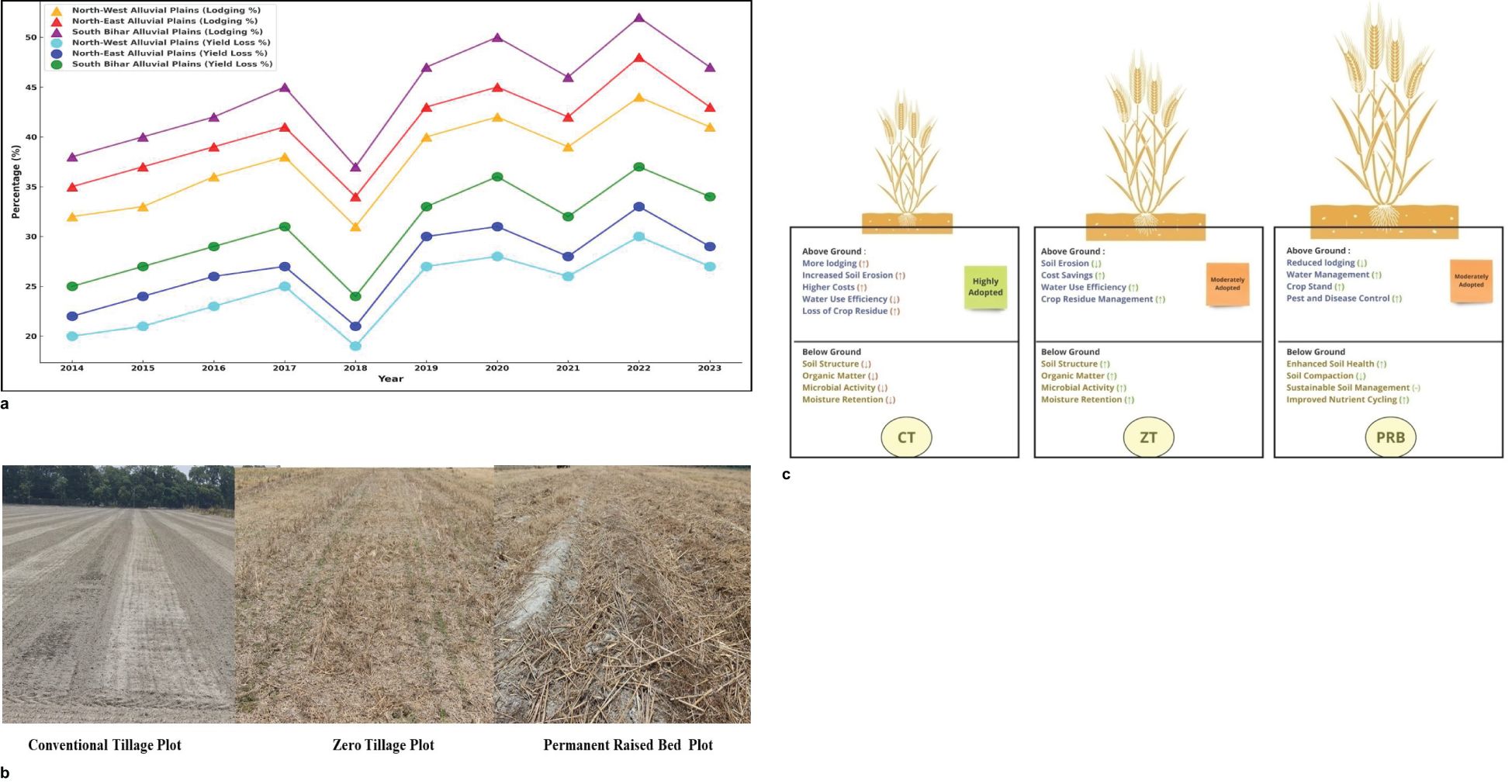
Figure 3. (a) Historical trends in wheat lodging incident and yield loss across various agro-climatic zones in Bihar (2014–2023). (b) Crop establishment methods used in the experimental plots: (i) conventional tillage (CT), (ii) zero tillage (ZT), and (iii) permanent raised bed (PRB). (c) Factor affecting wheat production system under different crop establishment methods.
2.4 Crop establishment methods and variety
In this study, three crop establishment methods were practiced: (i) CT, (ii) ZT, and (iii) PRB. The long experiment plots were divided into 20 replications for each establishment method (Figures 3b, c). Commonly, farmers cultivating the wheat variety HD2967 in the local region used it as the tested variety for all methods, sowing it at a depth of approximately 3–5 cm. Moreover, these three crop establishment methods (CT, ZT, and PRB) were implemented in farmers’ fields across different districts in the four agro-climatic zones of Bihar under the Climate-Resilient Agriculture Project (Figures 4, 5). Also, the yield and lodging data were collected and examined in these fields to ensure comprehensive results for different crop establishment methods under different climatic conditions. Owing to sandy soil conditions, the PRB method was not adopted in Zones II and IV (Figure 5). This methodology aims to assess the efficiency of different crop establishment methods in mitigating lodging in wheat production, thus providing fundamental insights for CRA. In this study, we selected the most cultivated wheat varieties (HD2967, DBW187, and DBW316) in the Bihar region. The characteristics of these tested varieties are detailed in Supplementary Table S1.
2.5 Sowing window
This study evaluated the impact of early and late sowing on lodging under a PRB system, using the HD 2967 wheat variety, which was sown at a depth of 3–5 cm. In the Bihar state, mid-November is generally considered the optimal window for wheat. However, because of the influence of preceding and succeeding cropping systems, as well as local climatic conditions, some farmers adopt early or late sowing practices. These variations in sowing time were specifically examined in this study to assess their impact on lodging susceptibility and wheat performance. In this study, two sowing windows were used: the first fortnight of November (07 November 2024) and the second fortnight of November (28 November 2024), with a 20-day interval between them.
2.6 Management practices
Management practices during the experimental period were meticulously implemented following the guidelines outlined in the BISA Wheat Cultivation Manual (https://bisa.org/download/bisa-annual-report-2022/). A structured timeline of management practices was also adhered to, as illustrated in Figure 5. The management practices encompassed in this study are summarized as follows: It emphasizes specific interventions such as sowing dates, fertilizer application including split doses of nitrogen, comprehensive pest and disease control strategies, seed treatment methods, meticulous irrigation scheduling, and harvesting. These practices are intended to synergistically improve crop yield, health, and overall farm productivity.
2.7 Measurement of wheat growth and yield parameters
Growth and yield parameters of number of productive tillers (m−²), biomass per tiller (g), stem diameter (cm), spike length (cm), spike weight (g), and number of grains per spike and grain yield were recorded per the All India Coordinated Research Project (AICRP) on Wheat and Barley guidelines (Singh et al., 2022). The samples were randomly collected in the net plot area at the time of harvest and analyzed as per the defined procedure.
2.8 Measurement of root parameters
Root parameters were assessed by excavating samples from a 10 cm × 15 cm pit to a depth of 30 cm. The collected root samples were carefully washed under running water to remove adhering soil particles. Root length and volume were determined using the water displacement method, while root dry weight was measured after oven-drying the samples at 65 ± 2°C for 72 h until a constant weight was achieved. All measurements were standardized and expressed per unit area (g/m² for dry weight and cm³/m² for volume).
2.9 Measurement of lodging
Lodging is one of the important consequences in crop production, and its measurement is necessary for assessing its effect on yield. Lodging determination was carried out at the late grain filling stage, corresponding to BBCH 83–85, when plants are most prone to lodging due to canopy weight and weather conditions. The three basic parameters used to assess the extent of lodging are the percentage of lodging, lodging score, and lodging index (Equations 1–4).
The lodged area was measured by visually identifying the portion of the plot where plants were tilted or flat, with a tilt angle greater than 45°. A quadrant (1 m2) was placed in the areas where plants were lodged within the plot. The total lodged area was then quantified based on the proportion of the plot area affected by lodging. This method allowed for accurate and consistent measurement of the lodged area in each treatment plot (Fu et al., 2022).
2.9.1 Percentage of lodging
Percentage of lodging is calculated as:
2.9.2 Lodging score
The lodging score is calculated using the formula by Fischer and Stapper (1987). The formula is:
where Plot area lodged (%) = (lodged area/net plot area) × 100; 0° angle from vertical = Main stem standing upright; 90° angle from vertical = Main stem laid down horizontally.
2.9.3 Lodging index
The lodging index is calculated using a modified version of the formula provided by Wiersma et al. (1986). The formula is:
where Plot area lodged (%) = (lodged area/net plot area) × 100; degree of lodging 0 = Main stem standing upright; degree of lodging 100 = Main stem laid down horizontally.
2.9.4 Yield loss due to lodging
The potential yield loss due to lodging can be estimated by the equation derived by Stapper and Fischer (1990). They assessed that approximately 0.5% of potential yield is lost for each percent area of wheat lodged, averaged over each day of the grain filling period. The formula is:
where the grain filling period (T) lasts from days 10 to 50 (generally, 10 days in India) of the 60 days lodging risk period and the potential grain yield of wheat α is taken as 8 t/ha.
2.10 Data analysis
Analysis of variance (ANOVA) used to compare significant differences among treatments, and this is accomplished using F-test providing statistical justification. Significance effect was concluded using a conventional threshold of p < 0.05. Post-hoc analyses, exclusively Tukey’s honestly significant difference (HSD) test, further interpreted specific differences between treatment means. The latest versions of “R Studio and Python” tools were used for actual data analysis to ensure comprehensive assessment of the experimental outcomes. This methodology not only emphasized the impacts of different agricultural practices under lodging but also provided insights into optimizing wheat yield and growth under variable conditions.
2.11 Correlation and regression analysis
The study evaluated the correlation between yield and weather parameters (rainfall and wind velocity) for both early- and late-sown crops using Pearson correlation coefficient, which indicates the strength and direction of these relationships on a scale from −1 to 1.
Additionally, multiple linear regression analyses were conducted using R Studio and Python to quantify the impact of rainfall and wind velocity on wheat yield under lodging conditions. Separate regression models were developed for early- and late-sown crops, providing equations that express the relationships and their predictive capabilities (Equation 5). The regression equations were expressed as follows:
where
β0: intercept (constant term)
β1: coefficient for wind speed
β2: coefficient for rainfall
ϵ: error term
3 Results
3.1 Effect of crop establishment on root attributes
Crop establishment methods significantly affected root length, root volume, and root dry weight (Figure 6). A plot using the PRB method recorded the extended root length (26.52 ± 0.53 cm), which was significantly greater than the ZT (22.64 ± 0.58 cm) and CT (17.60 ± 0.37 cm) methods. This resulted in the PRB method effectively influencing the root length and elongation. Data showed that the highest (180.09 ± 4.01 cm³) root volume was observed using the PRB method, followed by ZT (131.16 ± 4.01 cm³) and CT (100.38 ± 2.99 cm³). Similar results were exerted on the root dry weight. The higher root dry weight was recorded in the PRB method (160.96 ± 2.16 g/m2), which proved significant superiority over ZT (138.20 ± 2.05 g/m2) and CT (102.79 ± 1.39 g/m2), with the result representing a significant increase in biomass allocation to roots under the PRB method.

Figure 6. Effect of crop establishment methods on root parameters: (i) root length, (ii) root volume, and (iii) root weight.
3.2 Effect of crop establishment on yield attributes
Data showed the maximum number of productive tillers observed under PRB (394.85 ± 22.46/m2), which was significantly greater than that for ZT (371.90 ± 21.15/m2) and CT (337.90 ± 19.95/m2); the results indicated better crop establishment and tillering in PRB followed by the ZT method (Figure 7). Data showed that total biomass per tiller was highest (5.138 ± 0.239 g) at PRB, followed by ZT (5.069 ± 0.239 g), and was lowest at CT (4.947 ± 0.233 g), expressing better plant vigor in the conservation tillage methods. Stem diameter was significantly larger (1.550 ± 0.018 cm) in PRB, which is comparable to ZT (1.492 ± 0.020 cm), and the smallest stem diameter was observed in CT (1.352 ± 0.026 cm), representing more vital structural provision in PRB and ZT methods. The longer (11.69 ± 0.06 cm) spike length was found in PRB, followed by ZT (11.56 ± 0.07 cm), and the shortest spike length was observed in CT (11.12 ± 0.06 cm), whereas the highest (3.422 ± 0.006 g) spike weight was recorded in PRB, which was on par with ZT (3.414 ± 0.010 g), and the lowest spike weight was recorded in CT (3.305 ± 0.017 g). The number of grains per spike was significantly higher (72.110 ± 1.304) in PRB, followed by ZT (68.266 ± 1.137) and CT (63.129 ± 1.279), indicating better reproductive performance in the PRB and ZT systems.
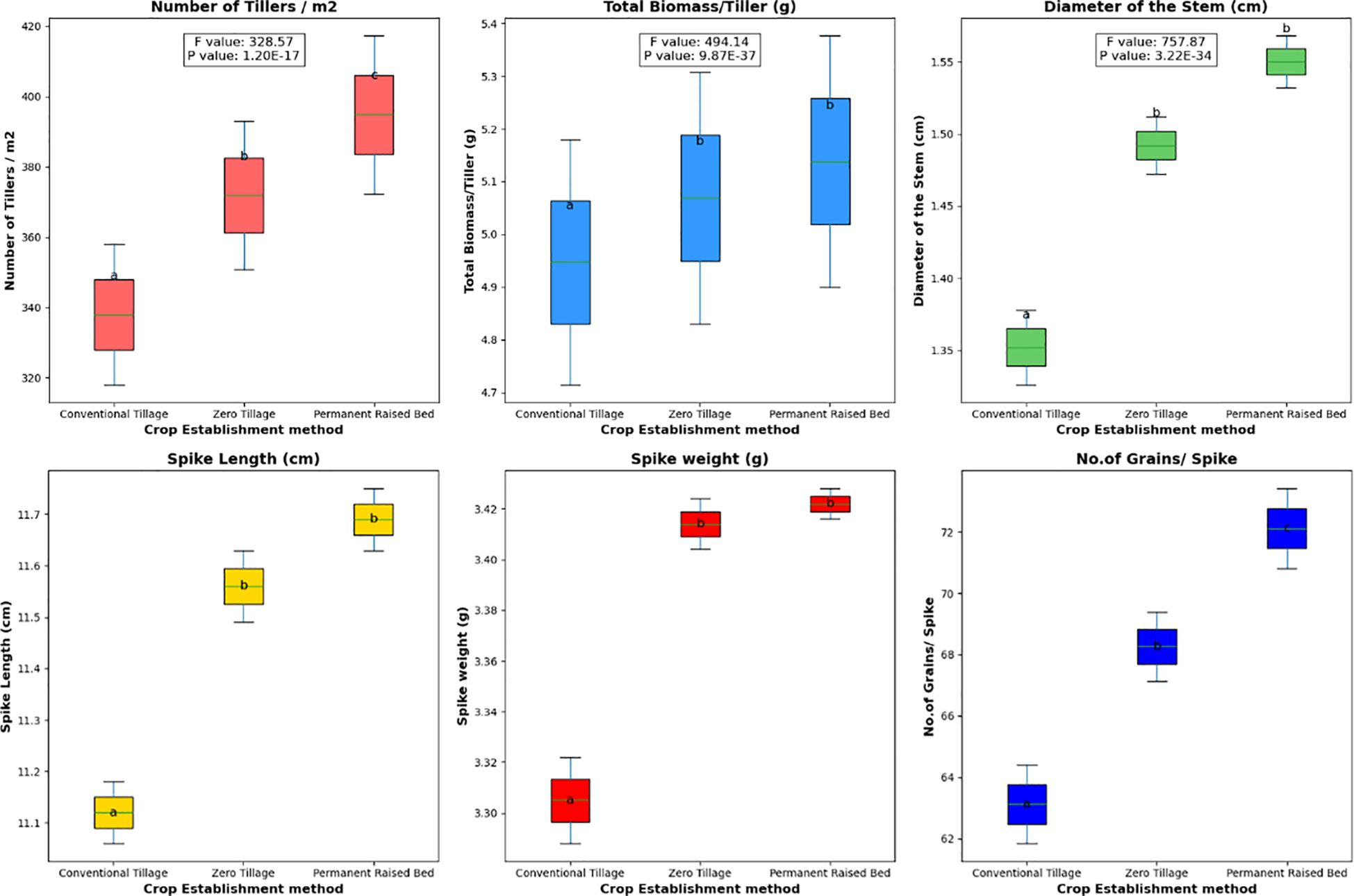
Figure 7. Effect of crop establishment on yield attributes: (i) number of tillers, (ii) total biomass, (iii) stem diameter, (iv) spike length, (v) spike weight, and (vi) number of grains per spike.
3.3 Effect of crop establishment on yield and yield losses
Among the crop establishment methods, the PRB system produced the highest grain yield (6.26 ± 0.19 t/ha), followed by ZT (5.48 ± 0.19 t/ha) and CT (4.86 ± 0.19 t/ha), highlighting the superior productivity of the PRB method. In contrast, yield loss was significantly lower in PRB (0.42 ± 0.01 t/ha) and ZT (1.04 ± 0.02 t/ha) compared to CT (1.426 ± 0.28 t/ha), highlighting the effectiveness of PRB and ZT in minimizing yield losses under lodging and other adverse climatic conditions (Figures 8, 9).

Figure 8. Effect of crop establishment methods: (i) conventional tillage (CT), (ii) zero tillage (ZT), and (iii) permanent raised bed (PRB) on yield and yield losses.

Figure 9. Effect of crop establishment methods: (i) conventional tillage (CT), (ii) zero tillage (ZT), and (iii) permanent raised bed (PRB) on lodging indices: (i) lodging score, (ii) lodging index, and (iii) lodging percentage.
3.4 Effect of crop establishment on lodging indices
Results showed that the lodging scores were lowest in PRB (0.92 ± 0.001), followed by ZT (3.16 ± 0.02), and highest in CT (63.47 ± 0.17), indicating better lodging resistance in PRB and ZT. Similarly, the lodging index was significantly lower in PRB (1.00 ± 0.01) and comparable to ZT (3.11 ± 0.02), whereas CT recorded the highest lodging index (60.53 ± 0.17). The lodging percentage also followed the same trend, with PRB showing the lowest lodging percentage (2.1% ± 0.04%), ZT had intermediate (5.2% ± 0.10%), and CT exhibited the highest lodging percentage (71% ± 1.43%). These results highlight the structural stability of PRB and ZT methods compared to CT (Figures 9, 10).
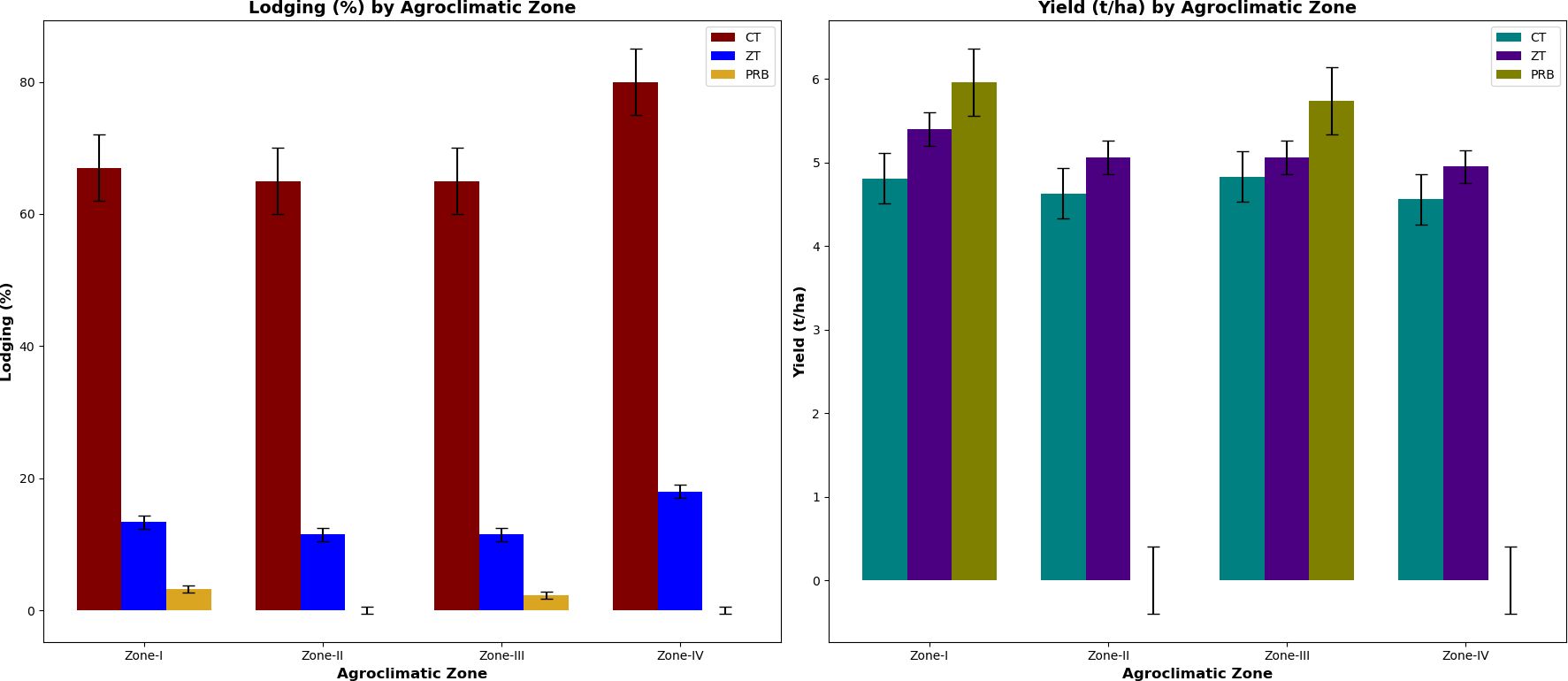
Figure 10. Effect of crop establishment methods: (i) conventional tillage (CT), (ii) zero tillage (ZT), and (iii) permanent raised bed (PRB) on lodging percentage and yield of wheat across different climatic zones in the experimental region.
3.5 Effect of crop establishment methods on lodging and yield across different agro-climatic zones
Data showed that at Zone I, CT had a high (67.02%) lodging and a low yield (4.805 t/ha). ZT reduced lodging to 13.38% (−80%) and increased yield to 5.40 t/ha (+12%). PRB performed best with 3.25% lodging (−95%) and 5.96 t/ha yield (+24%). In Zone II, CT had 65% lodging and a 4.63 t/ha yield. ZT improved these to 11.5% lodging (−82%) and a 5.06 t/ha yield (+9%). In Zone III, CT showed 65.50% lodging and a 4 t/ha yield. ZT reduced lodging to 11.5% (−82%) and increased yield to 5.16 t/ha (+29%). PRB had the best results with 2.3% lodging (−96%) and a 5.74 t/ha yield (+44%). In Zone IV, CT recorded 80% lodging and a 4.56 t/ha yield. ZT reduced lodging to 18% (−78%) and increased yield to 4.95 t/ha (+8%) (Figure 10).
3.6 Effect of varieties on grain yield and yield losses
Data indicated a significant variability in the three varieties of wheat (Figure 11). HD2967 produced a yield of 5.39 ± 0.52 t/ha, while DBW187 yielded 5.43 ± 0.57 t/ha and DBW316 produced 4.51 ± 0.27 t/ha (Figure 11). The statistical comparison between the three varieties demonstrated a highly significant variation. Higher yields of DBW187 and HD2967 depict the efficiency of these varieties under the prevailing agronomic practices, thus indicating their potential for higher productivity. However, yield losses due to lodging were recorded maximum in DBW316 with 1.68 ± 0.68 t/ha.
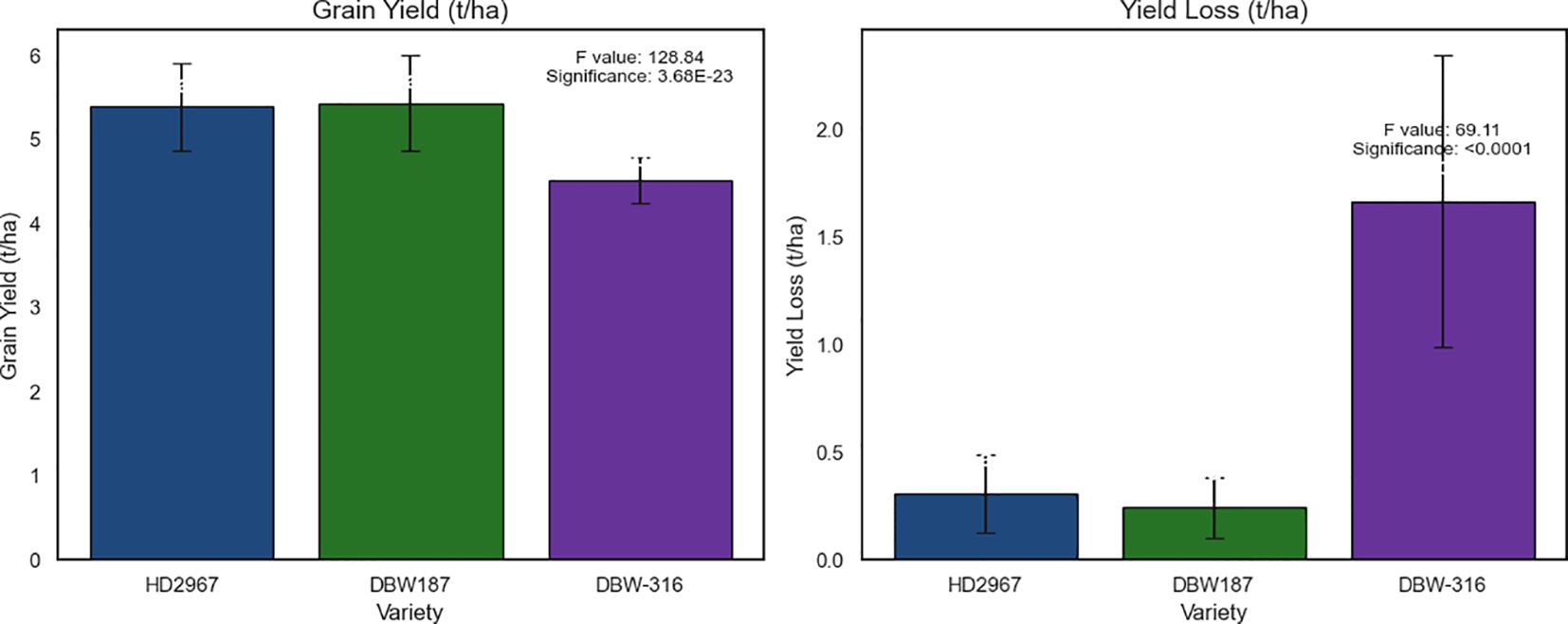
Figure 11. Performance of wheat varieties: (i) HD2967, (ii) DBW187, and (iii) DBW316 on (i) grain yield and (ii) yield losses.
3.7 Lodging of wheat varieties
Data showed that the lodging score of HD2967 was 11.449 ± 0. 372, while DBW187 had a score of 9.376 ± 0.308, and DBW316 had the highest score at 79.619 ± 0.400. The lower lodging score in HD2967 and DBW187 compared to DBW316 indicates better plant stability and, thus, better grain yield. The lodging index values also had variations that were statistically different. The lodging index of HD2967 was 10.755 ± 0.206; for DBW187, it was 8.440 ± 0.111, and the highest was DBW316 at 74.852 ± 0.648 (Figure 12).

Figure 12. Lodging indices influenced by various wheat varieties: (i) HD2967, (ii) DBW187, and (iii) DBW316, including (i) lodging score, (ii) lodging index, and (iii) lodging percentage.
Data showed that lodging percentage for HD2967 was 11.055% ± 0.233%, that for DBW187 was 10.780% ± 0.232%, and that for DBW316 was 75.055 ± 0.885%. These lodging percentages enhance the better lodging resistance of HD2967 and DBW187, reflecting their structural advantages and flexibility.
3.8 Influence of different sowing windows on yield and yield losses
In this study, wind speed (km/h) and total rainfall (mm) were recorded during early and late sowing periods for each wheat growth phase. These data were used to construct a model estimating yield losses based on lodging levels (Figure 13). The yield of the early-sown crop was substantially higher than that of the late-sown crop (Figure 14). Data indicated that higher yield was produced when the crop was sown early (5.88 ± 0.071 t/ha) than the late-sown crop (5.16 ± 0.083 t/ha). Despite this, the yield losses were found to be significantly higher in the late-sown crop at 0.53 ± 0.004 t/ha than in the early-sown crop at 1.41 ± 0.003 t/ha. The late-sown crop in the season also received higher wind speeds and heavy rainfall at the maturity stage, leading to more lodging and yield reduction.
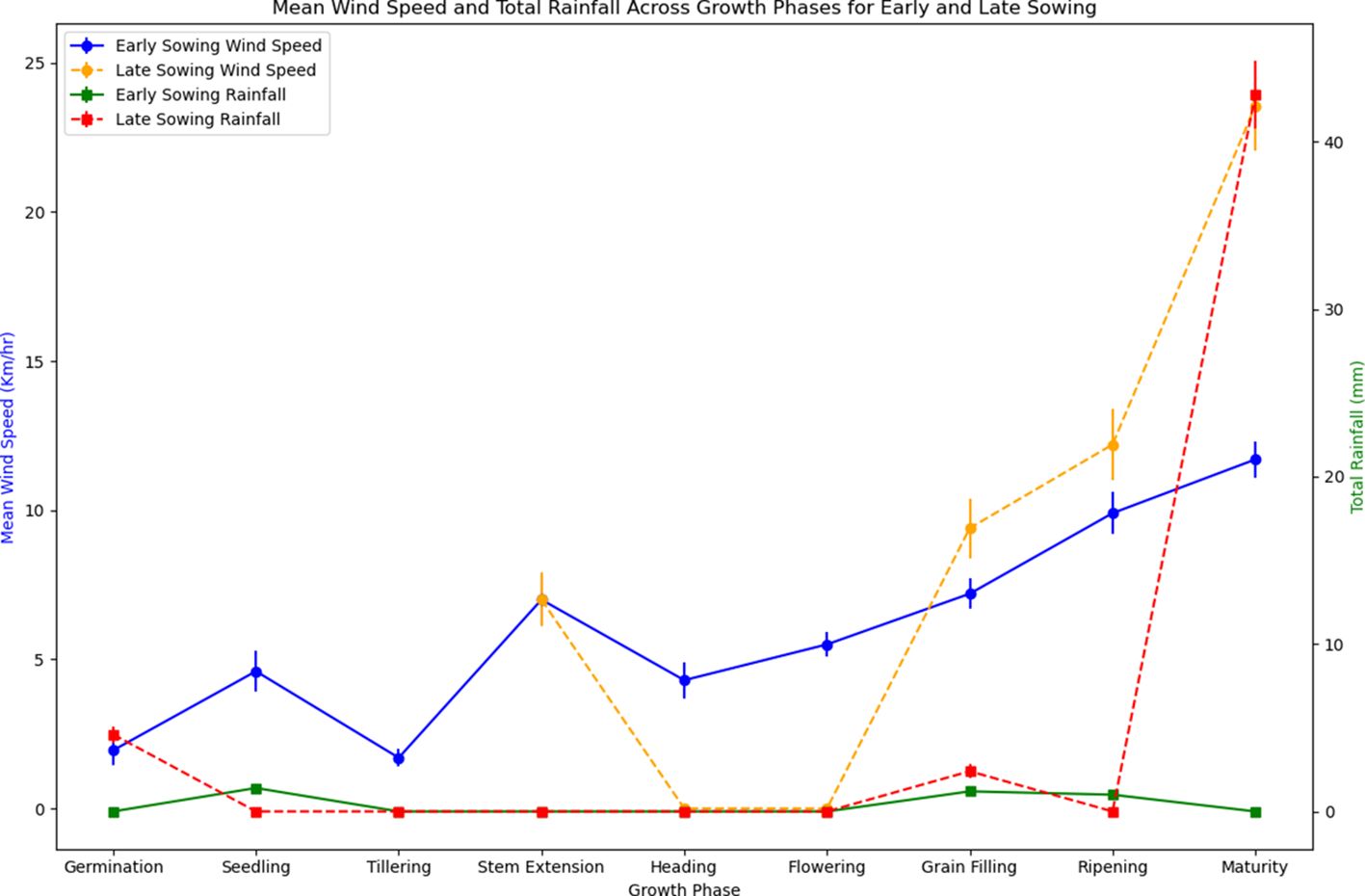
Figure 13. Effect of wind velocity and rainfall incidents on different growth stages: (i) germination, (ii) seedling, (iii) tillering, (iv) stem extension, (v) heading, (vi) flowering, (vii) grain filling, (viii) ripening, and (ix) maturity for the early and late sowing wheat crop periods.
3.9 Influence of different sowing windows on lodging indices
Results showed that the lodging score for the early-sown crop was 2.07 ± 0.017, whereas the late-sown crop recorded a significantly higher score of 3.31 ± 0.019 (Figure 15). The lodging index was lower for the early-sown crop, which was 2.29% ± 0.020%, whereas for the late-sown crop, it was 3.60% ± 0.023%. The lodging percentage was significantly lower in the early-sown crop (3.54% ± 0.057%) than in the late-sown crop (5.15% ± 0.069%).

Figure 15. Effect of sowing windows on lodging indices: (i) lodging score, (ii) lodging index, and (iii) lodging percentage.
3.10 Correlation between yield and rainfall/wind speed under the early and late sowing window
The correlation analysis revealed a weak positive relationship between wind speed (r = 0.133) and yield, and a stronger positive relationship between rainfall (r = 0.342) and yield during early sowing. In contrast, the late sowing data demonstrated a weak negative correlation between wind speed (r = −0.178) and yield, as well as between rainfall (r = −0.278) and yield (Table 1).
3.11 Stepwise regression between yield and rainfall/wind speed under the early and late sowing window
The regression analysis for early and late sowing was made to obtain predictive models of the effect of wind speed and rainfall on wheat yield (Table 2). This equation explained that for early sowing, a unit increase of 1 km/h in wind speed results in an increase in yield by 0.32 t/ha, and a 1-mm increase in rainfall results in a rise of 1.15 t/ha in yield. The R² value of 0.18 indicates that approximately 18% of the variation in yield can be explained by wind speed and rainfall. The remaining 82% of the variability in yield is due to other parameters. Results from the stepwise regression model show that, for late sowing, when wind speed increases by 1 km/h, there is a loss of 0.39 t/ha in yield, and each 1-mm increase in rainfall results in a loss of 0.12 t/ha in yield. The R² value of 0.29 indicates that approximately 29% of the variance in yield can be explained by wind speed and rainfall. The remaining 71% of the variability in yield is due to other factors (Table 2).
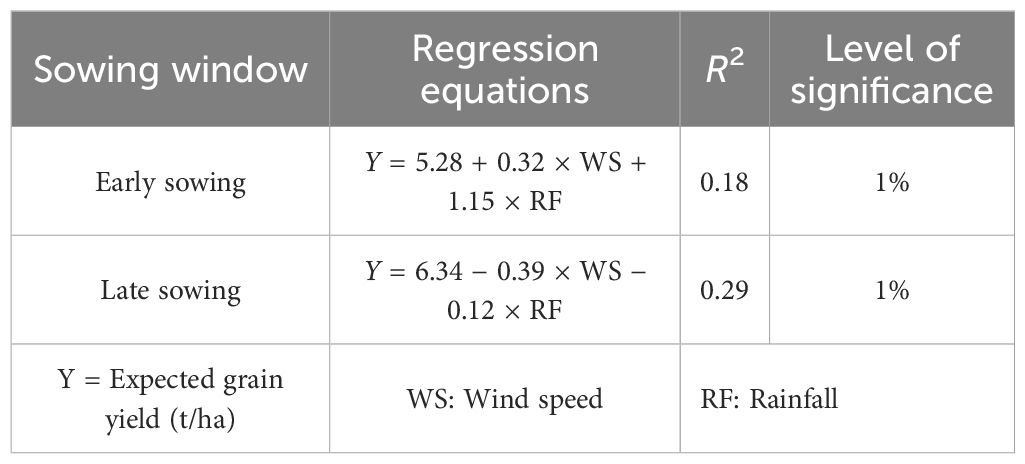
Table 2. Stepwise regression between yield and rainfall/wind speed under early and late sowing windows.
4 Discussion
4.1 Impact of crop establishment on root attributes
The study found that crop establishment methods significantly influenced root traits, with the PRB method showing the highest root length, volume, and dry weight, followed by ZT, indicating their superiority over CT in enhancing root development. The root length was longer in PRB and ZT because less soil disturbance increased soil aggregation, reducing the compactness of the soil and giving the roots ample penetration into the soil; it improves uptake and utilization to soil nutrients and water (Cui et al., 2023). Moreover, PRB and ZT methods improve the soil structure and water holding capacity, which is beneficial to root growth and development (Mazzoncini et al., 2011). The increased root volume and dry weight in PRB and ZT suggested that conservation tillage decreases soil compaction and increases the pore space accelerating better root development and biomass accumulation. This strength indicated that PRB and ZT methods improve plant stability and conserve moisture content and nutrient uptake, leading to better crop resilience and productivity under adverse climatic conditions (Ji et al., 2015).
4.2 Impact of crop establishment method on yield attributes
PRB resulted in significant increases compared to CT, with 57 more productive tillers, 0.191 g more biomass per tiller, 0.198 cm higher stem diameter, 0.57 cm longer spike length, 0.117 g higher spike weight, and 8.98 more grains per spike. Similarly, ZT also surpassed CT, with 34 more productive tillers, 0.122 g more biomass per tiller, 0.14 cm larger stem diameter, 0.44 cm longer spike length, 0.109 g higher spike weight, and 5.14 more grains per spike. Higher tiller numbers and biomass in ZT and PRB methods are attributed to improved soil health and enhanced microbial activity under non-tilled conditions (Govaerts et al., 2006; Jat et al., 2020). Larger stem diameter and enhanced spike attributes in these establishment methods are linked to improved plant nutrition and water availability, both critical for optimal crop growth and yield (Hobbs et al., 2008). This is supported by Zhang et al. (2017), and studies have shown that conservation tillage methods, by conserving soil moisture and enhancing nutrient cycling, promote more vigorous plant growth and greater yield potential. The increased number of grains per spike in ZT and PRB methods suggests favorable conditions during pollination and grain filling, critical stages for yield enhancement (Liu et al., 2022).
4.3 Impact of crop establishment methods on yield and yield losses
The PRB method resulted in a 29.1% higher grain yield compared to CT, and ZT had a 13.7% higher grain yield than CT. Regarding yield loss, PRB and ZT found a lower yield loss of 97.1% and 92.8%, respectively, compared to CT. The grain yield under the ZT and PRB methods was significantly higher compared with CT, reflecting the positive impacts of conservation tillage practices in enhancing moisture and nutrient availability (Hobbs et al., 2008). In fact, the grain yields observed in both PRB (5.96 t/ha) and ZT (5.40 t/ha) methods were notably higher than the average global wheat yield of 3.1 t/ha reported by FAO (2024), further emphasizing the effectiveness of these conservation tillage methods. The yield losses were significantly lower under the ZT and PRB methods, which play a beneficial role in minimizing adverse impacts from unfavorable climatic conditions. This could be attributed to conservation tillage, which improves soil moisture retention and reduces evaporation losses, influencing robust root growth and higher yield stability in adverse climatic conditions (Thierfelder and Wall, 2009; Yadav et al., 2024). Likewise, the higher yield stability and lower yield losses in ZT and PRB systems could be ascribed to their ability to retain higher soil organic content and better soil structure, which enhance root growth, sturdy stems, and crop resilience under stress conditions. These findings were corroborated by Verhulst et al. (2010) and Corbeels et al. (2016).
4.4 Impact of crop establishment methods on lodging indices
Lodging indices were significantly lower in the PRB and ZT establishment methods compared to CT (Figures 16, 17). PRB recorded the lowest lodging score (0.92), followed by ZT (3.16), both markedly better than CT (63.47). Similarly, the lodging index and percentage were lower in PRB (1.00, 2.1%) and ZT (3.11, 5.2%) compared to CT (60.53, 71%). These results highlight greater lodging resistance in conservation tillage practices compared to CT. This may be attributed to reduced soil compaction under conservation tillage, which promotes stronger root systems and enhanced stem strength, thereby reducing the risk of lodging due to weak root anchorage and stem breakage (Pinthus, 1974). The findings are reliable with the Bai et al. (2022) experiment, which found that conservation tillage enhances root biomass and length, providing better support for the plant and thus minimizing its susceptibility to lodging. Furthermore, the greater diameter of the stem found in PRB and ZT indicated that these methods promote stronger stems and reduce lodging risks (Berry et al., 2004).
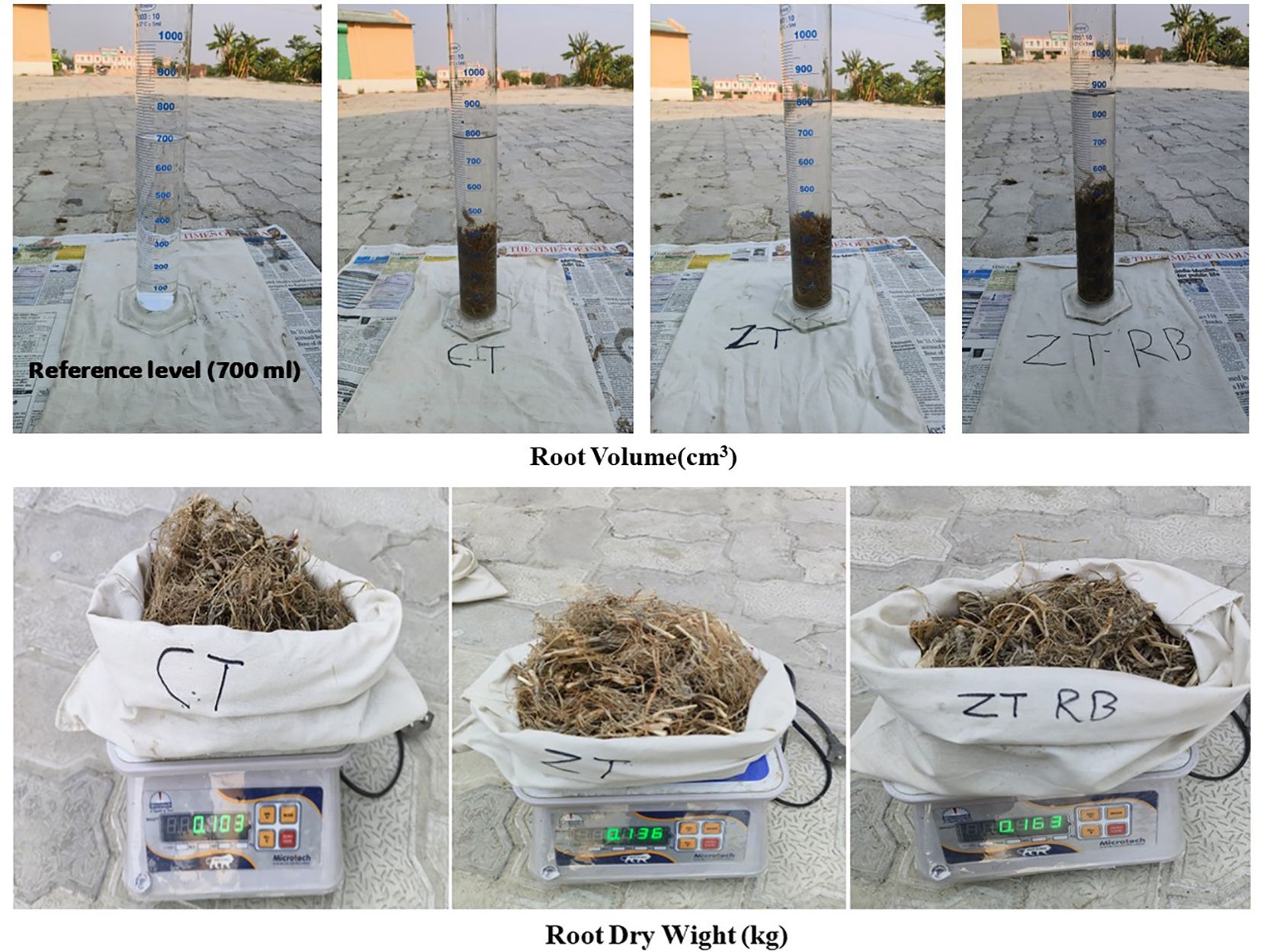
Figure 16. Effect of crop establishment methods: (i) conventional tillage (CT), (ii) zero tillage (ZT), and (iii) permanent raised bed (PRB) on lodging percentage and root parameters: (i) root volume and (ii) dry weight.

Figure 17. Impact (graphic view) of crop establishment methods: (i) conventional tillage (CT), (ii) zero tillage (ZT), and (iii) permanent raised bed (PRB) on lodging.
4.5 Impact of wheat varieties on grain yield and yield losses
Across the wheat varieties (HD2967, DBW187, and DBW316), significant variation was observed due to genetic and agronomic factors. HD2967 (5.39 t/ha) and DBW187 (5.43 t/ha) outperformed DBW316 (4.50 t/ha) in terms of lodging resistance. This can be attributed to their high yield potential, strong lodging and disease tolerance (especially rust), and optimal maturity period, which enable them to effectively utilize the growing season (Sharma et al., 2023). Similarly, the high yield of DBW187 is in line with its genetic makeup of heat and drought tolerance, which allows it to produce a good yield even under unfavorable weather conditions (Singh et al., 2020). Lodging caused significant yield losses, amounting to 1.668 t/ha for DBW316, 0.308 t/ha for HD2967, and 0.244 t/ha for DBW187. The higher yield loss in DBW316 can be attributed to its poor lodging resistance, which leads to greater crop damage and reduced grain yield. This finding aligns with existing literature, as varieties with high lodging susceptibility often experience greater yield reductions due to physical damage and impaired growth caused by lodging (Verma et al., 2022). HD2967 and DBW187, with lower yield losses, prove that their structural and genetic characteristics efficiently manage yield stability where there is such stress as lodging (Khan et al., 2025). These results emphasize the importance of integrating lodging resistance into high-yielding wheat varieties to ensure sustainable production (Gupta and Seth, 2007).
4.6 Impact of wheat varieties on lodging indices
Data showed that HD2967 (11.449 ± 0.372) and DBW187 (9.376 ± 0.308) had a significantly lower lodging score, in comparison with the DBW316 (79.619 ± 0.400). The modest susceptibility of HD2967 to lodging demonstrates that the good straw strength of HD2967 provides evidence against lodging (Figures 18, 19). However, it has been enhanced by precise agronomic practices such as optimum plant density and effective nutrient management (Gupta and Seth, 2007). The low lodging score of DBW187 implies that it has a strong stem and better standing ability, thus making it less susceptible to lodging even under adverse conditions (Singh et al., 2024). Conversely, DBW316 has a high lodging score indicating its susceptibility to lodging, particularly in areas with poor drainage or heavy rainfall and wind speed, which can negotiate its structural integrity and grain yield (Verma et al., 2022). The lodging index results also support lodging scores, revealing the significant variation in lodging resistance. HD2967 and DBW187 had lower values, showing the better lodging resistance of the two varieties. The lodging index measures a variety’s ability to withstand physical stress without incurring considerable yield loss. The low lodging index of DBW187 and HD2967 proves its genetic strength and structural support for lodging resistance, which is helpful for environmental conditions with lodging problems. In contrast, the high lodging index of DBW316 shows that the variety is prone to lodging and needs improvement in its structure traits and lodging resistance (Khobra et al., 2019; Singh et al., 2024). The lodging percentage, which is a significant indicator of the proportion of plants affected by lodging, also confirms the sturdiness and robustness of HD2967 and DBW187. The lodging percentage of HD2967 and DBW187 was significantly lower than that of DBW316. These lodging percentages represent structural characteristics and resistance against lodging of HD2967 and DBW187, which are crucial in reducing the impact of lodging on the yield (Singh et al., 2020). The high percentage of the lodging index of DBW316 could be an area of concern, and a focus on breeding program is needed to improve its resistance and suitability for high yield in lodging-prone environments (Sharma et al., 2023).
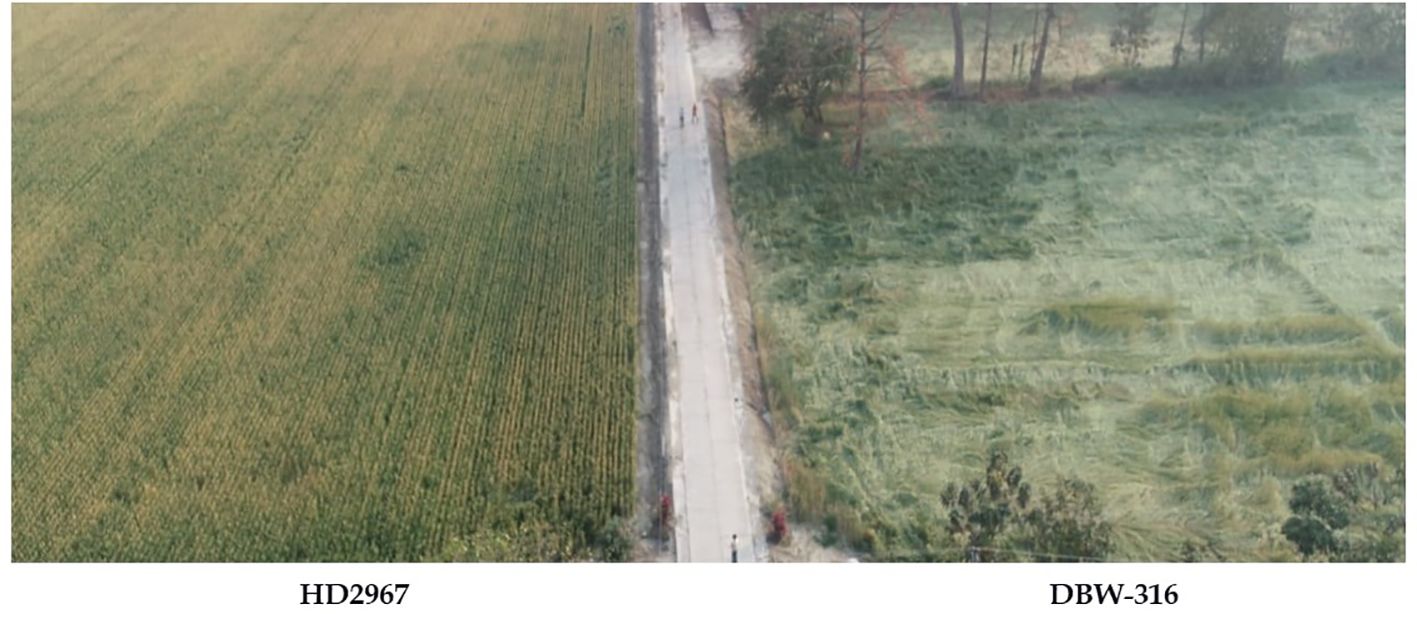
Figure 18. Aerial view of the impact of wheat varieties on lodging due to adverse climatic incidents.
4.7 Impact of sowing windows on yield and yield losses
The present findings also revealed that the early-sown crop produced a significantly higher yield (5.883 t/ha) than the late-sown crop (5.116 t/ha), which also supports the notion of early sowing for better crop productivity. Sowing seeds early in the season helps plants develop during optimal weather conditions. Therefore, crop produces healthier and more vigorous vegetation. During the grain filling and maturity stage, early-sown crop was faced with moderate wind speeds of 7.2 and 11.7 km/h, respectively, and a lower amount of rainfall of 1.2 and 0.0 mm, while the late-sown crop received higher wind speeds of 9.4 km/h during grain filling and 23.55 km/h during the maturity stage and a rainfall of 2.4 mm during the grain filling stage and 42.8 mm during the maturity stage. These conditions can worsen lodging because of increasing physiological stress on the plants. This stability is essential for achieving optimum yield, as supported by Adel and Carels (2023), who proved that crops established under a favorable environment produce optimum yield. The late-sown crop faced comparatively adverse conditions, especially during the ripening and maturity stage, with high wind speeds of 12.2 km/h during ripening and 23.55 km/h during maturity, and a rainfall of 42.8 mm during maturity increased the crop’s lodging and yield losses. Conversely, the early-sown crop experienced relatively lower wind speeds (9.9 km/h during ripening and 11.7 km/h during maturity) with no rainfall, which helps them escape lodging during these critical stages and decreasing the risk of lodging and yield losses. Studies by Gao et al. (2022) and Zhang et al. (2017) supported the strategy of the early-sown crop, which is less likely to be exposed to high wind speeds and heavy rainfall during the maturity and reproductive stage, thus minimizing crop lodging and yield losses, as emphasized by Thierfelder and Wall (2009).
4.8 Impact of sowing windows on lodging indices
Lodging indices, such as lodging scores, lodging index, and lodging percentage, show that the early-sown crop has higher lodging resistance than the late-sown crop (Figures 18, 19). The lower lodging score found in the early-sown crop was 2.18, and the higher score in the late-sown crop (3.39) indicates that the early-sown crop was less susceptible to lodging. This may be attributed to the more favorable climate condition for better crop establishment in the early-sown crop, thus allowing for sturdy stem and profuse root development. Berry et al. (2004), for instance, prove this by revealing that lower wind velocity and lower rainfall in early development stages improve stem strength and minimize the chances of lodging. Early-sown crops have a high degree of stem strength and plant robustness, making them less prone to lodging compared to late-sown crops (Fischer and Edmeades, 2010; Xiao et al., 2022). Likewise, early-sown crops exhibited a significantly lower lodging index (2.2885) compared to late-sown crops (3.5935); this lower lodging index was attributed to favorable climatic conditions during critical growth stages, such as moderate wind speeds and minimal rainfall during grain filling and maturity stages, as observed by Wang et al. (2015) and Shah et al. (2019). These conditions enhance lodging resistance and provide higher crop stability. Moreover, Zhang et al. (2017) and Liu et al. (2022) explained the detrimental effect of high wind speeds and rainfall during maturity on lodging risks in late-sown crops, which naturally experience adverse weather conditions at this stage. Regarding the lodging percentage, early-sown crops showed significantly lower lodging percentages, such as 3.54%, compared to late-sown crops with 5.15%, highlighting the benefits of early sowing in reducing lodging incidence. This advantage arises due to early-sown crops experiencing milder conditions during the maturity stage, such as lower wind speeds (11.7 km/h) and no rainfall, whereas late-sown crops face adverse weather conditions, such as a high wind speed of 23.55 km/h and a heavy rainfall of 42.8 mm during the maturity stage. These unfavorable weather conditions increase lodging risks in late-sown crops, as supported by findings emphasizing the importance of timely sowing in mitigating lodging (Zhang et al., 2020; Ali et al., 2016). Early sowing not only reduces lodging but also boosts overall crop growth and sustainable productivity.
4.9 Correlation between yield and rainfall/wind speed under the early and late sowing window
The correlation analysis of wind speed and rainfall with yield shows a weak positive relationship with wind speed (r = 0.133) and a strong positive relationship with rainfall (r = 0.342) during early sowing. These positive correlations suggest that moderate wind speeds and slight rainfall during the early growth stages can enhance crop yield. This finding is consistent with recent studies that have shown that moderate environmental conditions can improve wheat growth and development (Niu et al., 2016b; Kong et al., 2022). Late sowing data show a weak negative correlation between wind speed and yield (r = −0.178), as well as between rainfall and yield (r = −0.278). This indicates that increased wind speeds and higher rainfall during later growth stages negatively impact yield. This observation aligns with recent research indicating that adverse weather conditions can reduce crop yield (Williams and Diepeveen, 2019).
4.10 Stepwise regression between yield and rainfall/wind speed under the early and late sowing window
A stepwise regression model between yield and rainfall/wind speed under different sowing windows was developed. The data revealed that for the early-sown crop, each unit increase in wind speed increases yield by 0.32 t/ha, and each unit increase in rainfall increases yield by 1.15 t/ha (Figure 20). These findings imply that early-sown wheat crops benefit from moderate wind and rainfall, which likely support better pollination, nutrient uptake, and growth conditions, ultimately leading to higher yields (Rehman et al., 2024). Moreover, early-sown crops complete their life cycle before the onset of severe weather conditions, thus escaping the adverse effects that can lead to lodging. Regarding late-sown crops, the equation reveals that for each unit increase in wind speed, the yield decreases by 0.39 t/ha, and for each unit increase in rainfall, the yield decreases by 0.12 t/ha (Figure 20). During the maturity stage of late sowing, the regression analysis highlights the significant reduction in yield caused by high wind speeds and heavy rainfall. The high wind speed (23.55 km/h) and substantial rainfall (42.8 mm) during the maturity stage led to a significant yield penalty in the wheat crop. These adverse weather conditions at the maturity stage led to a significant decrease in yield. Lodging caused by high winds can bend or break the wheat stems, making harvesting difficult and reducing grain quality. Similarly, heavy rainfall can exacerbate these effects and increase the risk of fungal infections, further decreasing the overall yield (Li et al., 2018). Late-sown crops, therefore, suffer from these severe conditions that the early-sown crops avoid by completing their life cycle earlier (Feng et al., 2023).
5 Conclusion
This study underscores the critical impact of lodging on wheat production and emphasizes the need for effective strategies to mitigate its adverse effects (Figure 21). The adoption of the PRB method produced the highest grain yield, with an average of 6.263 t/ha (+15%), compared to that of CT of 4.86 t/ha. Additionally, PRB significantly reduces (18%) lodging compared to CT. ZT also shows promising results, improving yield by 10% and reducing lodging by 12% compared to CT. Among the varieties tested, HD2967 and DBW187 exhibited the lowest lodging score, 20% better than the DBW316 variety, indicating superior resilience under adverse conditions. Early sowing further enhanced yield potential, reducing yield losses by 14% and lodging by 15% compared to late sowing. Overall, it is recommended that wheat-cultivating farmers in subtropical India adopt the PRB or ZT method, use HD2967 and DBW187 varieties, and practice early sowing to maximize yield and minimize lodging impacts under adverse climatic conditions.
Data availability statement
The raw data supporting the conclusions of this article will be made available by the authors, without undue reservation.
Author contributions
RKJa: Conceptualization, Project administration, Writing – review & editing. VM: Conceptualization, Methodology, Project administration, Writing – original draft, Writing – review & editing. SP: Conceptualization, Validation, Writing – original draft, Writing – review & editing. RKSo: Conceptualization, Supervision, Writing – review & editing. RKJh: Supervision, Writing – review & editing. RNS: Supervision, Writing – review & editing. SDu: Formal Analysis, Project administration, Writing – original draft, Writing – review & editing. SKum: Conceptualization, Formal Analysis, Writing – review & editing. IR: Formal Analysis, Investigation, Project administration, Writing – review & editing. KC: Investigation, Methodology, Writing – review & editing. SM: Formal Analysis, Methodology, Resources, Visualization, Writing – review & editing. BK: Investigation, Software, Writing – review & editing. UU: Investigation, Methodology, Writing – review & editing. RKSi: Investigation, Methodology, Supervision, Writing – review & editing. RC: Formal Analysis, Investigation, Validation, Writing – review & editing. MK: Data curation, Methodology, Software, Writing – review & editing. VKu: Investigation, Methodology, Writing – review & editing. KMS: Methodology, Supervision, Writing – review & editing. SS: Investigation, Methodology, Writing – review & editing. RS: Methodology, Supervision, Writing – review & editing. SK: Investigation, Supervision, Writing – review & editing. KS: Methodology, Supervision, Writing – review & editing. GK: Conceptualization, Formal Analysis, Investigation, Writing – review & editing. RT: Methodology, Writing – review & editing. VKa: Data curation, Investigation, Writing – review & editing. SKus: Methodology, Writing – review & editing. SDa: Conceptualization, Investigation, Writing – review & editing. PG: Formal Analysis, Methodology, Writing – review & editing. SB: Data curation, Methodology, Writing – review & editing. RD: Methodology, Software, Writing – review & editing. AL: Investigation, Methodology, Writing – review & editing. BU: Formal Analysis, Investigation, Writing – review & editing. SKS: Formal Analysis, Investigation, Methodology, Writing – review & editing. SG: Formal Analysis, Investigation, Writing – review & editing. AD: Funding acquisition, Project administration, Resources, Supervision, Writing – review & editing.
Funding
The author(s) declare that financial support was received for the research and/or publication of this article. The authors sincerely acknowledge the financial and technical support provided by the Government of Bihar through the Climate-Resilient Agriculture (CRA) Program. We also extend our gratitude to the Indian Council of Agricultural Research (ICAR), CGIAR, and all donors whose contributions made this research possible.
Acknowledgments
We deeply appreciate the farmers for their time, resources, and invaluable insights, as well as the field technicians for their dedicated efforts in facilitating this study.
Conflict of interest
The authors declare that the research was conducted in the absence of any commercial or financial relationships that could be construed as a potential conflict of interest.
The author(s) declared that they were an editorial board member of Frontiers, at the time of submission. This had no impact on the peer review process and the final decision.
Generative AI statement
The author(s) declare that no Generative AI was used in the creation of this manuscript.
Publisher’s note
All claims expressed in this article are solely those of the authors and do not necessarily represent those of their affiliated organizations, or those of the publisher, the editors and the reviewers. Any product that may be evaluated in this article, or claim that may be made by its manufacturer, is not guaranteed or endorsed by the publisher.
Supplementary material
The Supplementary Material for this article can be found online at: https://www.frontiersin.org/articles/10.3389/fagro.2025.1535701/full#supplementary-material
References
Adel S. and Carels N. (2023). Plant tolerance to drought stress with emphasis on wheat. Plants 12, 2170. doi: 10.3390/plants12112170
Ahmad I., Batyrbek M., Ikram K., Ahmad S., Kamran M., Misbah Khan R.S., et al 2023. Nitrogen management improves lodging resistance and production in maize (Zea mays L.) at a high plant density. J. Integr. Agric. 22, 417–433. doi: 10.1016/j.jia.2022.08.074
Alhammad B. A., Roy D. K., Ranjan S., Padhan S. R., Sow S., Nath D., et al. (2023). Conservation tillage and weed management influencing weed dynamics, crop performance, soil properties, and profitability in a rice–wheat–greengram system in the eastern Indo-Gangetic plain. Agronomy 13, 1953. doi: 10.3390/agronomy13071953
Ali A. G., Omar M. A., Nawar A. I., and Tabbakh S. S. (2016). Effect of sowing date and nitrogen fertilization level on growth and productivity of some durum and bread wheat varieties. J. Alexandria Sci. Exchange 37, 542–549. doi: 10.21608/asejaiqjsae.2016.2526
Bai D., Li D., Zhao C., Wang Z., Shao M., Guo B., et al 2022. Estimation of soybean yield parameters under lodging conditions using RGB information from unmanned aerial vehicles. Front. Plant Sci. 13, 1012293. doi: 10.3389/fpls.2022.1012293
Berry P. M., Sterling M., Spink J. H., Baker C. J., Sylvester-Bradley R., Mooney S. J., et al. (2004). Understanding and reducing lodging in cereals. Adv. Agron. 84, 215–269. doi: 10.1016/S0065-2113(04)84005-7
Choudhary M., Panday S. C., Meena V. S., Yadav R. P., Singh S., Parihar M., et al. (2022). Long-term tillage and irrigation management practices: impact on carbon budgeting and energy dynamics under rice–wheat rotation of Indian mid-Himalayan region. Conserv 2, 388–401. doi: 10.3390/conservation2020026
Corbeels M., Marchão R. L., Neto M. S., Ferreira E. G., Madari B. E., Scopel E., et al. (2016). Evidence of limited carbon sequestration in soils under no-tillage systems in the Cerrado of Brazil. Sci. Rep. 6, 21450. doi: 10.1038/srep21450
Cui H., Luo Y., Li C., Chang Y., Jin M., Li Y., et al. (2023). Improving soil fertility and wheat yield by tillage and nitrogen management in winter wheat–summer maize cropping system. Agronomy 13, 740. doi: 10.3390/agronomy13030740
Das S., Kumar A., Giri N. C., Pal S., Banerjee H., Gaikwad D. J., et al. (2025). Impact of coated fertilizers and organic manure on soil health and productivity indicators in rice-based cropping systems of the Eastern Indo-Gangetic Plains of India. Field Crops Res. 329, 109966. doi: 10.1016/j.fcr.2025.109966
Derpsch R., Friedrich T., Kassam A., and Li H. (2010). Current status of adoption of no-till farming in the world and some of its main benefits. Int. J. Agric. Biol. Eng. 3, 1–25. doi: 10.3965/j.issn.1934-6344.2010.01.0-0
Farooq M., Flower K. C., Jabran K., Wahid A., and Siddique K. H. (2011). Crop yield and weed management in rainfed conservation agriculture. Soil tillage Res. 117, 172–183. doi: 10.1016/j.still.2011.10.001
Feng S., Shi C., Wang P., Ding W., Hu T., and Ru Z. (2023). Improving stem lodging resistance, yield, and water efficiency of wheat by adjusting supplemental irrigation frequency. Agronomy 13, 2208. doi: 10.3390/agronomy13092208
Fischer R. A., Byerlee D. R., and Edmeades G. O. (2009). Can technology deliver on the yield challenge to 2050? FAO Expert Meeting How to Feed World 2050.
Fischer R. A. and Edmeades G. O. (2010). Breeding and cereal yield progress. Crop Sci. 50, S–85. doi: 10.2135/cropsci2009.10.0564
Fischer R. A. and Stapper M. (1987). Lodging effects on high-yielding crops of irrigated semidwarf wheat. Field Crops Res. 17, 245–258. doi: 10.1016/0378-4290(87)90038-4
Foley J. A., Ramankutty N., Brauman K. A., Cassidy E. S., Gerber J. S., Johnston M., et al. (2011). Solutions for a cultivated planet. Nature 478, 337–342. doi: 10.1038/nature10452
Friedrich T., Derpsch R., and Kassam A. (2012). Overview of the global spread of conservation agriculture. Field actions Sci. Rep. J. Field Actions Special Issue 6). doi: http://journals.openedition.org/factsreports/1941
Fu Q., Fu J., Chen Z., Chen C., Zhang J., and Ren L. (2022). Measurement and analysis of root anchorage effect on stalk forces in lodged corn harvesting. Front. Plant Sci. 13, 852375. doi: 10.3389/fpls.2022.852375
Gao Z., Wang C., Zhao J., Wang K., Shang M., Qin Y., et al. (2022). Adopting different irrigation and nitrogen management based on precipitation year types of balances winter wheat yields and greenhouse gas emissions. Field Crops Res. 280, 108484. doi: 10.1016/j.fcr.2022.108484
Gathala M. K., Ladha J. K., Kumar V., Saharawat Y. S., Kumar V., Sharma P. K., et al. (2011). Tillage and crop establishment affects sustainability of South Asian rice–wheat system. Agron. J. 103, 961–971. doi: 10.2134/agronj2010.0394
Govaerts B., Sayre K.D., and Deckers J. 2006. A minimum data set for soil quality assessment of wheat and maize cropping in the highlands of Mexico. Soil Tillage Res. 87, 163–174. doi: 10.1016/j.still.2005.03.005
Gupta R. and Seth A. 2007. A review of resource conserving technologies for sustainable management of the rice–wheat cropping systems of the Indo-Gangetic plains (IGP). Crop Prot. 26, 436–447. doi: 10.1016/j.cropro.2006.04.030
Hasanain M., Singh V. K., Rathore S. S., Meena V. S., Meena S. K., Shekhawat K., et al. (2025). Sustainable strategies in maize-wheat systems: Integrating tillage, residue, and nutrient management for food-energy-carbon footprint optimization. Renew. Sustain. Energy Rev. 211, 115316. doi: 10.1016/j.rser.2024.115316
Hasanain M., Singh V. K., Rathore S. S., Meena V. S., Meena S. K., Shekhawat K., et al. (2024). Crop establishment and nutrient management options: Optimizing productivity, maximize profitability and mitigating adverse climatic conditions in the maize-based production system of Northwest India. Field Crops Res. 318, 109606. doi: 10.1016/j.fcr.2024.109606
Hobbs P. R., Sayre K., and Gupta R. (2008). The role of conservation agriculture in sustainable agriculture. Philos. Trans. R. Soc. B: Biol. Sci. 363, 543–555. doi: 10.1098/rstb.2007.2169
Hossain A., Skalicky M., Brestic M., Maitra S., Ashraful Alam M., Syed M. A., et al. (2021). Consequences and mitigation strategies of abiotic stresses in wheat (Triticum aestivum L.) under the changing climate. Agronomy 11, 241. doi: 10.3390/agronomy11020241
Jain M., Srivastava A. K., Joon R. K., McDonald A., Royal K., Lisaius M. C., et al. (2016). Mapping smallholder wheat yields and sowing dates using micro-satellite data. Remote Sens. 8, 860. doi: 10.3390/rs8100860
Jat M. L., Chakraborty D., Ladha J. K., Rana D. S., Gathala M. K., McDonald A., et al. (2020). Conservation agriculture for sustainable intensification in South Asia. Nat. Sustainability 3, 336–343. doi: 10.1038/s41893-020-0500-2
Jat H. S., Datta A., Choudhary M., Sharma P. C., and Jat M. L. (2021). Conservation Agriculture: factors and drivers of adoption and scalable innovative practices in Indo-Gangetic plains of India–a review. Int. J. Agric. Sustainability 19, 40–55. doi: 10.1080/14735903.2020.1817655
Ji Q., Wang Y., Chen X. N., and Wang X. D. (2015). Tillage effects on soil aggregation, organic carbon fractions and grain yield in Eum-Orthic Anthrosol of a winter wheat–maize double-cropping system, Northwest China. Soil Use Manage. 31, 504–514. doi: 10.1111/sum.2015.31.issue-4
Jinger D., Dhar S., Dass A., Sharma V.K., Jhorar P., Paramesh V., et al 2023. Combined fertilization of silicon and phosphorus in aerobic rice–wheat cropping and its impact on system productivity, water use efficiency, soil health, crop resilience, and profitability. Silicon 15, 7609–7620. doi: 10.1007/s12633-023-02598-x
Khan A., Liu H. H., Ahmad A., Xiang L., Ali W., Khan A., et al. (2019). Impact of nitrogen regimes and planting densities on stem physiology, lignin biosynthesis and grain yield in relation to lodging resistance in winter wheat (Triticum aestivum L.). Cereal Res. Commun. 47, 566–579. doi: 10.1556/0806.47.2019.21
Khan H., Parkash O., Mamrutha H. M., Bairwa R. K., Mishra C. N., Kumar R., et al. (2025). Foliar application of chlormequat chloride improves lodging resistance and grain yield in bread wheat. Plant Physiol. Rep. 30, 199–205. doi: 10.1007/s40502-024-00824-1
Khedwal R. S., Chaudhary A., Sindhu V. K., Yadav D. B., Kumar N., Chhokar R. S., et al. (2023). Challenges and technological interventions in rice–wheat system for resilient food–water–energy-environment nexus in North-western Indo-Gangetic Plains: A review. Cereal Res. Commun. 51, 785–807. doi: 10.1007/s42976-023-00355-9
Khobra R., Sareen S., Meena B. K., Kumar A., Tiwari V., and Singh G. P. (2019). Exploring the traits for lodging tolerance in wheat genotypes: a review. Physiol. Mol. Biol. Plants 25, 589–600. doi: 10.1007/s12298-018-0629-x
Kong X., Peng P., Li L., Zhang K., Hu Z., Wang X., et al. (2022). Wind lodging-associated yield loss is reduced by wheat genetic diversity. Eur. J. Agron. 133, 126441. doi: 10.1016/j.eja.2021.126441
Koskey G., Leoni F., Carlesi S., Avio L., and Bàrberi P. (2022). Exploiting plant functional diversity in durum wheat–lentil relay intercropping to stabilize crop yields under contrasting climatic conditions. Agronomy 12, 210. doi: 10.3390/agronomy12010210
Kumar R., Naresh R. K., Bhatt R., Chandra M. S., Kumar D., Alamri S., et al. (2023). Tillage crop establishment and irrigation methods improve the productivity of wheat (Triticum aestivum): Water use studies, and the biological properties and fertility status of soil. Agronomy 13, 1839. doi: 10.3390/agronomy13071839
Ladha J. K., Dawe D., Pathak H., Padre A. T., Yadav R. L., Singh B., et al. (2003). How extensive are yield declines in long-term rice–wheat experiments in Asia? Field Crops Res. 81, 159–180. doi: 10.1016/S0378-4290(02)00219-8
Lakhani A. L., Patel B. P., and Gajera M. N. (2024). Unlocking the potential of zero-tillage farming: challenges, opportunities, and key influences on adoption. J. Exp. Agric. Int. 46, 1027–1036. doi: 10.9734/jeai/2024/v46i82791
Lal R. (2015). Restoring soil quality to mitigate soil degradation. Sustainability 7, 5875–5895. doi: 10.3390/su7055875
Li B., Wang T., and Meng F. (2018). Double quantitative analysis of the effects of meteorological factors on winter wheat yield at different growth stages based on grey relational analysis. J. Grey System 30, 31–44.
Liu Y., Han M., Zhou X., Li W., Du C., Zhang Y., et al. (2022). Optimizing nitrogen fertilizer application under reduced irrigation strategies for winter wheat of the north China plain. Irrigation Sci. 39, 1–11. doi: 10.1007/s00271-021-00764-w
Martínez S. (2021). Pasture Length and Stubble Impacts on Soilborne Diseases and Grain Yield of Rice in No-Tillage Rotations. (SSRN Electron). doi: 10.2139/ssrn.4728985
Mazzoncini M., Sapkota T. B., Barberi P., Antichi D., and Risaliti R. (2011). Long-term effect of tillage, nitrogen fertilization and cover crops on soil organic carbon and total nitrogen content. Soil tillage Res. 114, 165–174. doi: 10.1016/j.still.2011.05.001
McDonald A. J., Keil A., Srivastava A., Craufurd P., Kishore A., Kumar V., et al. (2022). Time management governs climate resilience and productivity in the coupled rice–wheat cropping systems of eastern India. Nat. Food 3, 542–551. doi: 10.1038/s43016-022-00549-0
Meena S. K., Dwivedi B. S., Meena M. C., Datta S. P., Singh V. K., Mishra R. P., et al. (2024). Insights from a 19-year field study: optimizing long-term nutrient supply strategies for enhanced crop productivity and nutritional security in rice–wheat systems. Discov. Appl. Sci. 6, 512. doi: 10.1007/s42452-024-06195-4
Meena S. K., Dwivedi B. S., Meena M. C., Datta S. P., Singh V. K., Mishra R. P., et al. (2022a). Impact of long-term nutrient supply options on soil aggregate stability after nineteen years of rice–wheat cropping system. Land 11, 1465. doi: 10.3390/land11091465
Meena S. K., Dwivedi B. S., Meena M. C., Datta S. P., Singh V. K., Mishra R. P., et al. (2022b). Long-term nutrient supply options: strategies to improve soil phosphorus availability in the rice-wheat system. Sustain 14, 8629. doi: 10.3390/su14148629
Meena S. K., Dwivedi B. S., Meena M. C., Datta S. P., Singh V. K., Mishra R. P., et al. (2022c). Long-term nutrient management in an intensive rice-wheat cropping system improves the quantities, qualities, and availability of soil sulfur. Front. Sustain. Food Syst. 6. doi: 10.3389/fsufs.2022.997269
Niu L., Feng S., Ding W., and Li G. (2016a). Influence of speed and rainfall on large-scale wheat lodging from 2007 to 2014 in China. PloS One 11, e0157677. doi: 10.1371/journal.pone.0157677
Niu L., Feng S., Ding W., and Li G. (2016b). Influence of speed and rainfall on large-scale wheat lodging from 2007 to 2014 in China. PloS One 11, e0157677. doi: 10.1371/journal.pone.0157677
Parewa H. P., Yadav J., Meena V. S., Sarkar D., Meena S. K., Rakshit A., et al. (2022). Improved nutrient management practices for enhancing productivity and profitability of wheat under Mid-Indo-Gangetic Plains of India. Agric 12, 1472. doi: 10.3390/agriculture12091472
Pathak H., Prasad S., Bhatia A., Singh S., Kumar S., Singh J., et al. (2003). Methane emission from rice–wheat cropping system in the Indo-Gangetic plain in relation to irrigation, farmyard manure and dicyandiamide application. Agriculture Ecosyst. Environ. 97, 309–316. doi: 10.1016/S0167-8809(03)00033-1
Pinthus M.J. 1974. Lodging in wheat, barley, and oats: the phenomenon, its causes, and preventive measures. Adv. Agron. 25, 209–263. doi: 10.1016/S0065-2113(08)60782-8
Pittelkow C. M., Liang X., Linquist B. A., Van Groenigen K. J., Lee J., Lundy M. E., et al. (2015). Productivity limits and potentials of the principles of conservation agriculture. Nature 517, 365–368. doi: 10.1038/nature13809
Rehman M., Luo D., Mubeen S., Pan J., Cao S., Saeed W., et al. (2024). Progress in agronomic crops lodging resistance and prevention: A review. J. Agron. Crop Sci. 210, e12785. doi: 10.1111/jac.v210.6
Rempelos L., Almuayrifi M. S. B., Baranski M., Tetard-Jones C., Barkla B., Cakmak I., et al. (2020). The effect of agronomic factors on crop health and performance of winter wheat varieties bred for the conventional and the low input farming sector. Field Crops Res. 254, 107822. doi: 10.1016/j.fcr.2020.107822
Sayre K. D. and Hobbs P. R. (2004). “The raised bed system of cultivation for irrigated production conditions,” in Sustainable agriculture and the international rice-wheat system (CRC press), 354–372.
Shah L., Yahya M., Shah S. M. A., Nadeem M., Ali A., Ali A., et al. (2019). Improving lodging resistance: using wheat and rice as classical examples. Int. J. Mol. Sci. 20, 4211. doi: 10.3390/ijms20174211
Sharma T., Das T. K., Maity P. P., Biswas S., Sudhishri S., Govindasamy P., et al. (2023). Long-term conservation agriculture influences weed diversity, water productivity, grain yield, and energy budgeting of wheat in north-western Indo-Gangetic plains. Sustainability 15, 7290. doi: 10.3390/su15097290
Sharma P. C., Datta A., Yadav A. K., Choudhary M., Jat H. S., and McDonald A. (2019). Effect of crop management practices on crop growth, productivity and profitability of Rice–Wheat System in Western Indo-Gangetic Plains. Proc. Natl. Acad. Sciences India Section B: Biol. Sci. 89, 715–727. doi: 10.1007/s40011-018-0985-x
Singh Y., Jat H., and Jat S. (2020). “Wheat productivity enhancement through climate smart practices,” in Improving cereal productivity through climate smart practices (Woodhead Publishing, Elsevier, Amsterdam), 255–268.
Singh H., Kingra P. K., Pal R. K., and Singh S. (2024). Impact of abiotic stresses on wheat yield and strategies for mitigation: a comprehensive review. Agric. Res. J. 61, 155–166. doi: 10.5958/2395-146X.2024.00022.8
Singh P., Singh G., Gupta A., and Sodhi G. P. S. (2023). Data envelopment analysis-based energy optimization for improving energy efficiency in wheat established following rice residue management in rice-wheat cropping system. Energy 284, 128615. doi: 10.1016/j.energy.2023.128615
Singh R., Singh A., Sheoran P., Fagodiya R. K., Rai A. K., Chandra P., et al. (2022). Energy efficiency and carbon footprints of rice-wheat system under long-term tillage and residue management practices in western Indo-Gangetic Plains in India. Energy 244, 122655. doi: 10.1016/j.energy.2021.122655
Srinivasarao C., Lakshmi C. S., Rakesh S., Mohanty M., Narayanaswamy G., Kundu S., et al. (2023). “Soil constraints and management options for sustainable rainfed production systems of India,” in Soil Constraints and Productivity (CRC Press), 491–509.
Stapper M. and Fischer R. A. (1990). Genotype, sowing date and plant spacing influence on high-yielding irrigated wheat in southern New South Wales. II. Growth, yield and nitrogen use. Aust. J. Agric. Res. 41, 1021–1041. doi: 10.1071/AR9901021
Thierfelder C. and Wall P. C. (2009). Effects of conservation agriculture techniques on infiltration and soil water content in Zambia and Zimbabwe. Soil tillage Res. 105, 217–227. doi: 10.1016/j.still.2009.07.007
Verhulst N., Govaerts B., Verachtert E., Castellanos-Navarrete A., Mezzalama M., Wall P., Deckers J., and Sayre K.D. (2010) Conservation Agriculture, Improving Soil Quality for Sustainable Production Systems? In: Lal, R. and Stewart, B.A., Eds., Advances in Soil Science: Food Security and Soil Quality, CRC Press, Boca Raton, 137–208.
Verma H., Pathak R. K., Kumar A., Sachan R., Pandey H. P., Tiwari A., et al. (2022). Effect of integrated nutrient management on growth parameters, yield components and yield of wheat (Triticum aestivum L.) under central plain zone of Uttar Pradesh. Int. J. Plant Soil Sci. 34, 1050–1057. doi: 10.9734/ijpss/2022/v34i232515
Wang X., Vignjevic M., Liu F., Jacobsen S., Jiang D., Wollenweber B., et al 2015. Drought priming at vegetative growth stages improves tolerance to drought and heat stresses occurring during grain filling in spring wheat. Plant Growth Regul. 75, 677–687. doi: 10.1007/s10725-014-9969-x
Wiersma D. W., Oplinger E. S., and Guy S. O. (1986). Environment and cultivar effects on winter wheat response to ethephon plant growth regulator 1. Agron. J. 78, 761–764. doi: 10.2134/agronj1986.00021962007800050002x
Williams R. M. and Diepeveen D. A. (2019). Evaluating the impact of rainfall and temperature on wheat dough strength in Western Australia. Cereal Chem. 96, 370–379. doi: 10.1002/cche.2019.96.issue-2
Xiao D., Bai H., Liu D. L., Tang J., Wang B., Shen Y., et al. (2022). Projecting future changes in extreme climate for maize production in the North China Plain and the role of adjusting the sowing date. Mitigation Adaptation Strategies Global Change 27, 21. doi: 10.1007/s11027-022-09995-4
Yadav K., Kumar M., Gulaiya S., Singh N., Singh S., Salar A., et al. (2024). Adverse impacts of lodging and strategies for management in cereal crops: a comprehensive review. Plant Arch. 24, 495–503. doi: 10.51470/PLANTARCHIVES.2024.v24.no.2.069
Zhang Z., Flores P., Igathinathane C., L. Naik D., Kiran R., and Ransom J. K. (2020). Wheat lodging detection from UAS imagery using machine learning algorithms. Remote Sens. 12, 1838. doi: 10.3390/rs12111838
Keywords: crop establishment method, lodging indices, sowing window, varietal selection, climate change
Citation: Jat RK, Meena VS, Pazhanisamy S, Sohane RK, Jha RK, Singh RN, Durgude S, Kumar S, Reddy IR, Choudhary KM, Meena SK, Kumar B, Umesh UN, Singh RK, Chaubey R, Kumar M, Kumar V, Sharda K, Singh S, Singh RK, Kumari S, Singh KM, Kumar G, Tiwari RK, Kashyap V, Kushwaha S, Das S, Gautam PP, Bhagat S, Devi RC, Lenka AK, Upadhaya B, Singh SK, Ghosh S and Das A (2025) Enhancing wheat resilience in subtropical agroecosystems through climate-resilient agriculture strategies. Front. Agron. 7:1535701. doi: 10.3389/fagro.2025.1535701
Received: 27 November 2024; Accepted: 27 May 2025;
Published: 24 June 2025.
Edited by:
Alexandros Tataridas, University of Coimbra, PortugalReviewed by:
Victor Idowu Olugbemiga Olowe, Federal University of Agriculture, Abeokuta, NigeriaGilbert Koskey, Sant’Anna School of Advanced Studies, Italy
Copyright © 2025 Jat, Meena, Pazhanisamy, Sohane, Jha, Singh, Durgude, Kumar, Reddy, Choudhary, Meena, Kumar, Umesh, Singh, Chaubey, Kumar, Kumar, Sharda, Singh, Singh, Kumari, Singh, Kumar, Tiwari, Kashyap, Kushwaha, Das, Gautam, Bhagat, Devi, Lenka, Upadhaya, Singh, Ghosh and Das. This is an open-access article distributed under the terms of the Creative Commons Attribution License (CC BY). The use, distribution or reproduction in other forums is permitted, provided the original author(s) and the copyright owner(s) are credited and that the original publication in this journal is cited, in accordance with accepted academic practice. No use, distribution or reproduction is permitted which does not comply with these terms.
*Correspondence: Raj Kumar Jat, ci5qYXRAY2dpYXIub3Jn; S. Pazhanisamy, cC5zZWx2YWdhbmVzYW5AY2dpYXIub3Jn; Vijay Singh Meena, dmlqYXlzc2FjLmJodUBnbWFpbC5jb20=; Sunita Kumari Meena, c3VtZWVuYTY2QGdtYWlsLmNvbQ==
 Raj Kumar Jat
Raj Kumar Jat Vijay Singh Meena
Vijay Singh Meena S. Pazhanisamy
S. Pazhanisamy R.K. Sohane3
R.K. Sohane3 Illathur R. Reddy
Illathur R. Reddy Sunita Kumari Meena
Sunita Kumari Meena Sanchita Ghosh
Sanchita Ghosh Anup Das
Anup Das